Gas Cars vs.Electric Cars Essay: Compare & Contrast
Need to write an electric cars benefits essay or an electric cars vs. gas cars compare and contrast paper? Then make sure to read this sample for inspiration!

Introduction
Similarities between electric & gas cars, differences between electric & gas cars, electric cars: advantages, fuel cars: advantages, conclusion: electric cars vs. gas cars, electric cars vs. gas cars faq.
There has been a lot of development in the car industry, especially if comparing the current achievements to the first car models in the 19th century. Many people believe that electric cars are the future as they have numerous environmental and health benefits. Others think that electric cars are bad and gas cars cannot be replaced.
The reasons for the newest modifications also include environmental issues and the cost of gas. Gas- and diesel-powered cars are getting more of a luxurious item than ever before. Therefore, people have started looking for alternative power solutions.
Through trial and error, developers could come up with the idea of electric cars. Today, all the most notable car brands have their electric car model. The variety of choices can be confusing for the potential buyer, however.
It leads us to the purpose of this compare and contrast essay on electric cars vs. gas cars. Similarities and differences between them are discussed in the first two parts. Then, the advantages of each type of car are presented separately. The conclusion reveals the outcome of this battle.
Electric and gas cars look the same on the outside. Even though the models vary from brand to brand, a newbie probably will not know the difference between electric and gas cars.
Both types are shaped to resist the wind, which is common sense in the car industry. Also, they share standard features like mirrors and indicators as they are the universal parts of all cars. It also includes the wheel, pedals, and car seats.
Besides, it is quite evident that both electric and gasoline cars serve the same purpose, transporting passengers and goods. Moreover, the general interior features would also be similar.
Furthermore, there are only a few differences in how the owner can tune his car. Just like washing both vehicles would be quite the same.
However, this is where the similarities between electric and gas cars end. The engines, the way they are powered, and all the related processes are entirely different. It is even easy to distinguish an electric car from the gas one by sound.
Therefore, if the way the car works does not matter to the owners, they would only notice the difference in general maintenance. However, as soon as it comes to the inside of the car, there is minimal resemblance.
First, it is evident from the name that electric cars are powered by electricity, and gas cars need gasoline to work. Next, let us move to the engine. One of the most amazing things about electric vehicles is that they have the motor as the only big moving part.
There is a pack of rechargeable batteries inside it, which powers the motor. In turn, it powers the drive train, and it causes the car to move. Gas cars, on the other hand, need combustion engines for that. Fuel or diesel is burnt inside, providing enough power to start the engine.
Gas cars have a fuel tank hidden in the back behind the seat. In electric vehicles, there is a set of batteries installed. Therefore, instead of filling the tank with gasoline, an owner would need to top off the battery in the electric vehicle.
There are fewer moving parts in electric cars too. It also means that their owners face fewer issues with maintenance. The engine of the gas car is amazingly complex, not to mention all the other parts needed to make power out of fuel.
Last but not least, electric cars do not leave a trace of emissions on the roads. Unlike gas-powered vehicles, they do not have a tailpipe because it is unnecessary. However, there is a recharge socket on the body of the car. Its place depends on where the batteries are located.
Now, let us check the advantages of electric vehicles compared to standard gas cars. This part of the essay would benefit those considering purchasing a car soon.
Efficiency related to energy might be one of the best benefits of electric cars. Sixty percent of all the energy contained by the set of batteries goes to powering the wheels. On the other hand, gas cars only convert 20 percent of the energy that comes from fuel to run the wheels.
Another top advantage of electric cars is that they are environmentally friendly. This topic is so popular now, not only because eco-friendly stuff is trendy. It is a significant concern for the whole population of our planet. Switching to options that do not harm our ecosystem is a matter of survival, not fashion.
Unlike their fuel-powered counterparts, electric cars do not produce any emissions. However, there is a trick. If they are charged from a generator, there may be some concerns about how eco-friendly it is. However, if the power used for charging derives from wind or solar plants, the whole process is 100 percent clean.
Electric cars are also considered to be more comfortable and pleasant with a bonus of surplus performance. They are much quieter and drive smoother than their gas-powered relatives. Another pleasantly surprising feature is that their acceleration rate is extreme.
Another excellent addition to owning an electric car is that the maintenance of these cars is much cheaper, thanks to the small number of moving parts. Moreover, owners of electric vehicles can be proud of significantly reduced energy dependence.
Since the invention of cars, people have had to rely on a low number of energy sources. A simple shortage of oil can shut down a big chunk of transportation. Moreover, it is not just an assumption but our foreseeable future. Electric vehicles and hydrogen fuel-cell cars are here to secure the transportation industry.
Despite all the benefits of electric cars, internal combustion engines have significant advantages against them. One of the main reasons that probably keeps people away from buying electric vehicles is their driving range.
With the full tank, a gas vehicle can go about 300 miles before being refilled. On the other hand, fully charged electric vehicles can only travel 100-200 miles without an additional recharge.
Therefore, fuel-powered cars are more reliable in terms of going for long-distance travel. Moreover, some remote areas do not necessarily guarantee a regular electricity supply. For instance, going for a road trip in Iceland or a safari in Africa on an electric car might not be 100 percent safe.
Advantage number two is that refilling a gas car is much faster than charging an electric one. It might take a long time for the latter, depending on the vehicle type and the charging speed. It could take somewhat from 30 minutes to 12 hours.
Tesla cars were supposed to have a speed-up feature on the development day. They were promising that it would also be possible to change the battery pack in a few minutes at the charging points. However, it would cost quite a lot. The project ended up being closed.
In contrast, you only need to stop for about 5 minutes at the gas station to fill the car with gas. Moreover, there are many more gas stations around the country than charging points. In case of an emergency, carrying a heavy and large battery pack that provides driving power for electric cars is not the most pleasant thing.
The last point is that fuel-powered cars are much more common everywhere than electric vehicles. Therefore, finding a replacement for any damaged part is not a big challenge. It is not the case with electric cars, especially in places where they are not so popular yet.
This essay on electric cars vs. fuel cars discussed the similarities and differences between them. After that, the unique strengths and weak points of both types of vehicles were highlighted.
The cars may look alike outside, but the engines and everything inside are drastically different. Electric cars are cheaper and more efficient in maintenance. Besides, they do not harm the environment. On the other hand, fuel cars are better for long distances and faster to refill.
The conclusion of the electric cars essay is that fuel cars appear to have fewer strengths. However, it might take time for electric vehicles to become more common so that recharging and maintenance issues would be solved.
What are the differences between electric cars and gas cars?
There are many differences between electric cars and gas cars. The main one is the way they are powered. Electric cars have fewer parts that are moving. The motor is the only one. Fuel-powered cars, on the other hand, have a very complex system. Look how complicated the engine is. It creates a difference in maintenance too.
Which is better: electric or gas cars?
It is hard to tell whether electric or gas cars are better. It all depends on how popular electric cars are in a specific location. From the perspective of maintenance and efficiency, they can easily beat gas cars. However, there should be enough charging points. So, owning an electric car can be troublesome if the infrastructure is not developed.
Which is faster: electric or gas cars?
Generally speaking, gas cars are faster than electric cars. However, the latter ones accelerate way much quicker because there is no need for the usual transition. Also, an electric vehicle can reach your destination point faster than a gas one. However, for now, its top speed is lower than the standard fuel-powered vehicles can reach.
What are the disadvantages of an electric car?
There are some disadvantages to an electric car that reduce its efficiency. The main one is the range. They can travel for distances twice shorter than the usual gas vehicles. The next weak point is the time it takes to recharge. Depending on the charging point and the type of battery, it can take up to 12 hours.
Are electric cars unsafe?
Just a few aspects can prove that electric cars are safe. They might be safer than the usual fuel-powered vehicles. First thing first, gas cars need gas to run. That makes sense, right? But gasoline and diesel are highly flammable substances which make them quite dangerous. Also, electric vehicles have fewer parts, so they wear out less frequently.
Fueleconomy.gov. n.d. All-Electric Vehicles. [online]
Afdc.energy.gov. n.d. Alternative Fuels Data Center: How Do All-Electric Cars Work?. [online]
The Economist. 2020. Wireless Charging Of Electric Cars Looks Increasingly Promising. [online]
Energy.gov. n.d. Electric Vehicle Benefits. [online]
EECA Business. 2019. Benefits And Considerations Of Electric Vehicles. [online]
Fueleconomy.gov. n.d. Fuel Cell Vehicles – Benefits And Challenges. [online]
Wynn, G., 2010. Gasoline Still Has Some Advantages As Fuel. [online] Nytimes.com.
Kanellos, M., 2012. Which Are Better: Electric Cars Or Natural Gas Vehicles?. [online] Forbes. Web.
Cite this paper
- Chicago (N-B)
- Chicago (A-D)
StudyCorgi. (2020, July 8). Gas Cars vs.Electric Cars Essay: Compare & Contrast. https://studycorgi.com/electric-cars-vs-gas-cars-compare-contrast-essay/
"Gas Cars vs.Electric Cars Essay: Compare & Contrast." StudyCorgi , 8 July 2020, studycorgi.com/electric-cars-vs-gas-cars-compare-contrast-essay/.
StudyCorgi . (2020) 'Gas Cars vs.Electric Cars Essay: Compare & Contrast'. 8 July.
1. StudyCorgi . "Gas Cars vs.Electric Cars Essay: Compare & Contrast." July 8, 2020. https://studycorgi.com/electric-cars-vs-gas-cars-compare-contrast-essay/.
Bibliography
StudyCorgi . "Gas Cars vs.Electric Cars Essay: Compare & Contrast." July 8, 2020. https://studycorgi.com/electric-cars-vs-gas-cars-compare-contrast-essay/.
StudyCorgi . 2020. "Gas Cars vs.Electric Cars Essay: Compare & Contrast." July 8, 2020. https://studycorgi.com/electric-cars-vs-gas-cars-compare-contrast-essay/.
This paper, “Gas Cars vs.Electric Cars Essay: Compare & Contrast”, was written and voluntary submitted to our free essay database by a straight-A student. Please ensure you properly reference the paper if you're using it to write your assignment.
Before publication, the StudyCorgi editorial team proofread and checked the paper to make sure it meets the highest standards in terms of grammar, punctuation, style, fact accuracy, copyright issues, and inclusive language. Last updated: January 23, 2024 .
If you are the author of this paper and no longer wish to have it published on StudyCorgi, request the removal . Please use the “ Donate your paper ” form to submit an essay.
- What's My Car Worth?
- Buyer's Guide
Electric Cars vs. Gas Cars: Everything You Need to Know
Electric vehicles provide advantages over gas cars, but there are drawbacks. We look at the pros and cons including price, cost to own, charging, and range.
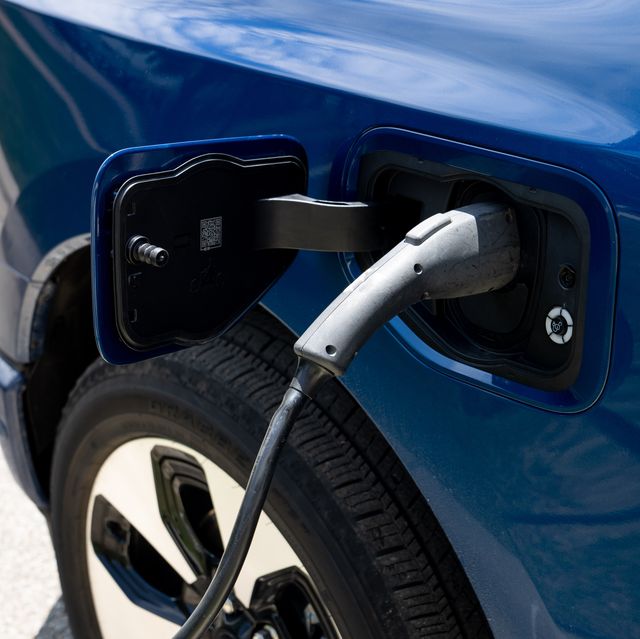
Whether you are looking for a new vehicle that will be inexpensive to run or you want to reduce your CO2 emissions, you might be looking at an electric car for your next purchase.
Electric vehicles, or EVs, provide many advantages over conventional gasoline cars, but there are some drawbacks as well. Before you take the plunge, here are the things you should know.
Shifting From Conventional to Electric
If you're considering joining this trend and purchasing an electric vehicle, you should understand how EVs differ from the internal-combustion vehicles we're used to, both in terms of cost and the ownership experience.
Types of Electric Vehicles
When people refer to electric vehicles, they're typically talking about Battery-Electric Vehicles (BEVs). These are solely powered by electricity. They use a large battery pack that supplies energy to an electric motor (or multiple motors) to power the vehicle. Think of the battery pack as the gas tank and the electric motor as the engine. Current popular BEV models include:
- Chevrolet Bolt EV
- Tesla Model 3
- Ford Mustang Mach-E
- Hyundai Ioniq 5
- Volkswagen ID.4
Hybrid vehicles also use electric motors, but in combination with gasoline engines to power the car. The difference between a hybrid and a plug-in-hybrid electric vehicle (PHEV) is right in the name: a PHEV's battery can be charged by plugging in and is typically much larger than a hybrid's battery pack, which means it can provide meaningful electric-only range (typically 10 to 50 miles). Hybrid Electric Vehicles (HEVs) cannot be plugged in and instead use the gasoline engine to recharge the battery pack. Many vehicles sold today offer both hybrid and nonhybrid models.
Costs of Conventional Cars vs. Electric Cars
The difference in cost between owning and operating an electric car compared with a gasoline car is one of the most important considerations. There are several factors you'll need to think about, including the cost of fuel and maintenance, as well as the overall purchase price of the vehicle itself.
Electric cars tend to be more expensive to buy upfront. For instance, the electric 2023 Volkswagen ID.4 starts at $38,790 while the similarly sized, gasoline-powered Volkswagen Tiguan starts at $27,785. However, as electric vehicles become more mainstream, the upfront cost difference is declining and there are far more affordable options to choose from. An electric vehicle tax credit , including up to $7500 that can be claimed on your federal tax return, may also help you save on your purchase. There are also state and local incentives.
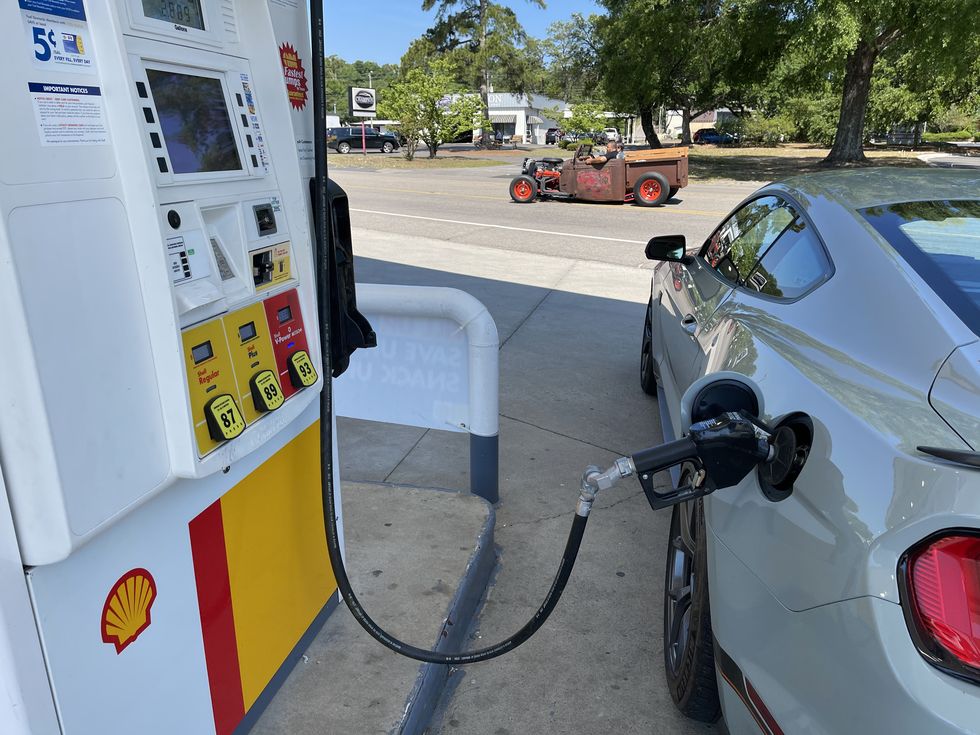
Cost to Charge Electric Cars vs. Fuel Gas Cars
The most obvious difference between electric vehicles and gas-powered or internal-combustion-engine (ICE) vehicles is that EVs require electricity, and gas cars run on gasoline.
The concept of MPG, or miles per gallon, measures the fuel efficiency of gasoline vehicles. Electric vehicles' efficiency is measured in MPGe, or miles per gallon equivalent.
While the price of gas varies over time and location, the national average for a gallon of regular gas was $4.19 in August 2022. If a standard gasoline car holds about 14 gallons on average, that means it costs just under $60 to fill up. Fuel-efficient vehicles travel more miles per gallon, meaning they need to be filled up less often and cost you less per mile.
The electricity that powers EVs can come from a variety of sources. Electricity is produced from burning gas or coal, or from renewable sources such as hydropower, wind, or solar. Electricity prices vary depending on whether you charge at home or whether you charge at public charging stations. Some energy companies also charge more for using electricity at peak hours. DC fast-charging stations, such as Electrify America or EVgo, usually cost far more than traditional "slow" charging stations, and tend to be about three times more expensive per kilowatt of energy than charging at home.
Regardless of these differences, electric cars are often cheaper to run than gasoline cars because of their better energy efficiency. The EPA estimates that the electric Kia EV6, for instance, would cost $550 to fuel over the course of a year, while the gas-powered Kia K5 would cost $1950 to fuel. This estimate is based on driving 15,000 miles per year and current fuel and electricity prices, and assumes all charging happens at home . If you plan to do a lot of public fast charging, that cost will rise. To take it to the extreme and assume all charging is done at public fast chargers (an extremely unlikely scenario), the annual total rises to $1850 per year, nearly equaling the gas-powered K5's estimate, using Electrify America's current rate of $0.43/kWh.
While gas vehicles' driving range depends on the size of the gas tank and fuel efficiency, refueling is as easy as stopping at a gas station for a few minutes at a time. Electric cars generally lag behind in terms of driving range but have made great strides in driving range and charging in recent years. Indeed, in our 75-mph highway-range test, a Lucid Air Grand Touring is the first to go more than 400 miles. Many of today's EVs are estimated to go over 300 miles on a charge, and fast-charging capabilities allow you to regain a significant number of miles in a matter of minutes. But long-distance drives may still require some planning, as you'll have to figure out where charging stations are along your route and how long you'll have to stop to replenish the battery.
Maintenance Costs
Electric vehicles also tend to have lower maintenance costs, as electric motors and batteries require less routine care than gasoline engines do. They don't require regular oil changes, for instance. Of course, there are still day-to-day expenses such as auto insurance, tire rotations, and brake maintenance that both gasoline cars and EVs require. We've previously calculated that the cost to maintain an EV can be around a third of the cost to maintain an equivalent gas car over a period of five years.
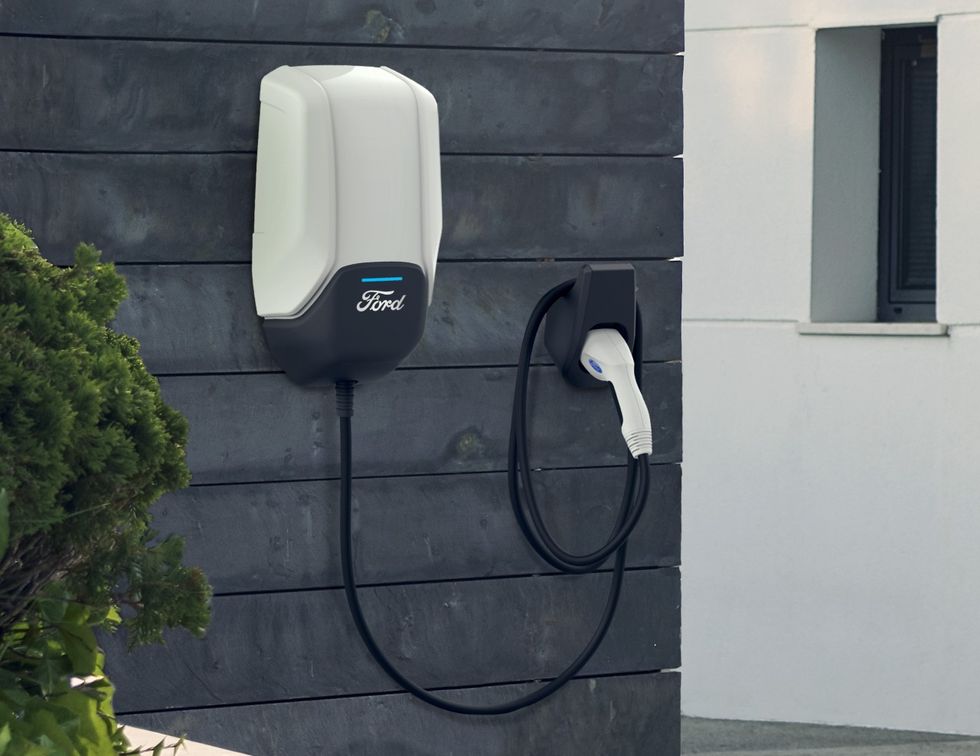
Quick vs. Fast
Another way to evaluate the differences between gas cars and EVs is to look at the driving experience. Because electric motors function so differently from internal-combustion engines, you might be surprised at how an electric car feels to drive the first time you get behind the wheel.
Generally speaking, electric motors make their maximum torque at 0 rpm; this makes their acceleration feel more instantaneous at low speeds than gas-powered c. EVs are often quicker than gasoline cars, but they're not always faster. This means that they can go from, say, 30 to 50 mph far more quickly but that their top speeds are often lower than gas cars'.
Vehicle Selection
In terms of vehicle selection, gasoline cars still come out ahead, with hundreds of different models offered. There are only about 30 purely EV models offered by manufacturers to choose from. But the variety of electric vehicles has increased dramatically and there are now electric pickup trucks, electric luxury vehicles, and many different electric SUVs on sale in the U.S. Many more EV models are slated to arrive within the next few years , which will expand the palette further.
If you're considering buying an electric car vs. a gas car, there are a number of issues to consider, including overall cost, emissions, and vehicle selection. Keep these in mind as you shop for your new car.

.css-190qir1:before{background-color:#000000;color:#fff;left:0;width:50%;border:0 solid transparent;bottom:48%;height:0.125rem;content:'';position:absolute;z-index:-10;} Electric Vehicles .css-188buow:after{background-color:#000000;color:#fff;right:0;width:50%;border:0 solid transparent;bottom:48%;height:0.125rem;content:'';position:absolute;z-index:-10;}
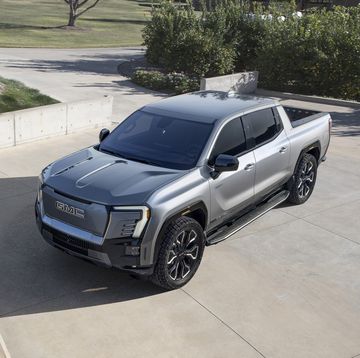
Electric Vehicle FAQs
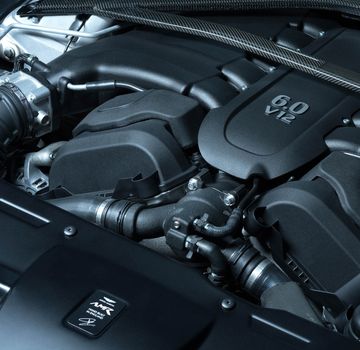
Aston Martin to Continue Selling Gas-Engined Cars
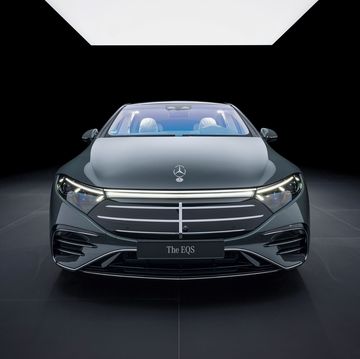
2025 Mercedes-Benz EQS Debuts New Look, More Range
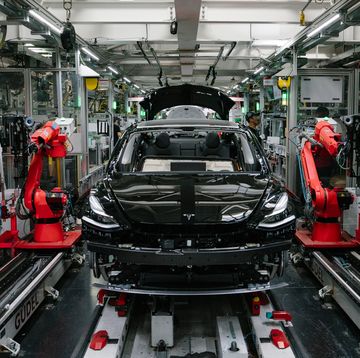
Report: Tesla Pulls the Plug on Sub-$30K Model 2
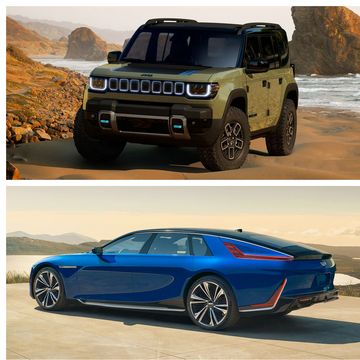
Future EVs: Every Electric Vehicle Coming Soon
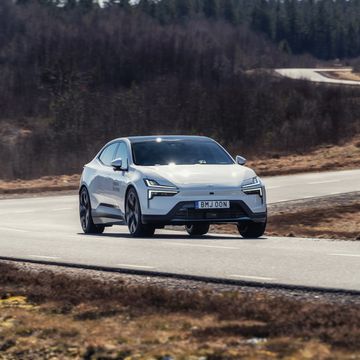
2025 Polestar 4 Pricing Information Revealed
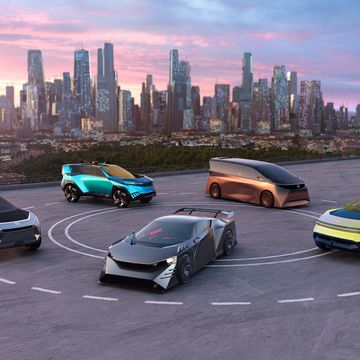
Nissan to Launch 7 New Models in the U.S. by 2026
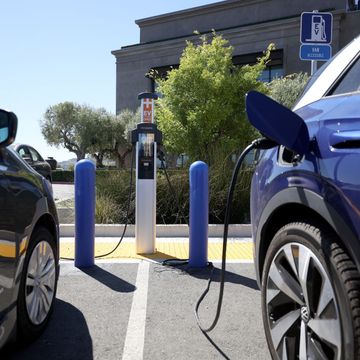
How Long Does It Take to Charge an Electric Car?
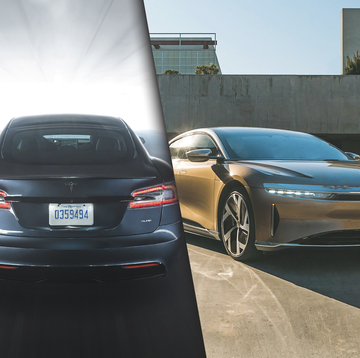
Quickest EVs Tested: 60 MPH in under 3.5 Seconds
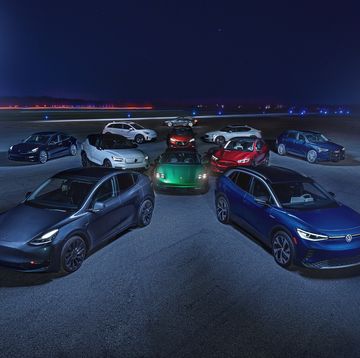
These EVs Get the $3750 or $7500 Federal Credit
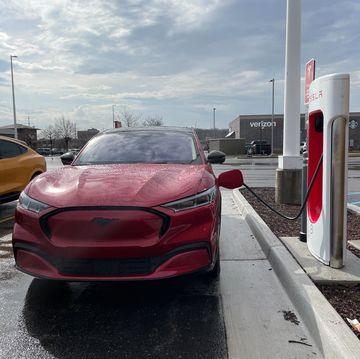
Other EVs Can Now Use Tesla Superchargers

The EV Feed
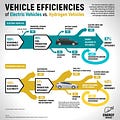
Battery Electric Vehicles vs Hydrogen Fuel Cell Vehicles: A Comparative Analysis
An in-depth, unbiased comparison of battery electric vehicle and hydrogen fuel cell vehicle technology, efficiency, costs, infrastructure, sustainability impacts, and future potential..

The automotive industry is witnessing a paradigm shift with the rise of electric vehicles (EVs) and the introduction of hydrogen fuel cell vehicles (FCEVs). As the world grapples with climate change, the search for sustainable transportation solutions has never been more critical. This article will provide a comprehensive, unbiased (honestly!) comparison between Battery Electric Vehicles (BEVs) and Hydrogen Fuel Cell Vehicles, exploring their efficiency, infrastructure, costs, and sustainability impacts.
Key Takeaways : Both BEVs and FCEVs can offer long ranges suitable for most driving, but rapid charging is far more accessible for BEVs currently. Hydrogen fueling infrastructure lags far behind electric charging stations, creating a major adoption barrier for FCEVs. BEVs demonstrate higher well-to-wheel efficiency, converting over 59% of electrical energy to power versus 25-30% for FCEVs. Green hydrogen production methods are needed to reduce FCEV emissions but remain underdeveloped compared to BEVs charged by renewable energy. While FCEVs face challenges, they may fill important niches like long-haul transportation that complement smaller passenger EVs.
How Battery Electric Vehicles Work
Battery and powertrain technology in bevs.
Battery Electric Vehicles, or BEVs, operate using a battery pack that stores electricity, which powers an electric motor to drive the wheels. The battery is typically a lithium-ion type, known for its high energy density and long lifespan. The electric motor, power electronics, and battery work together to form the powertrain, converting electrical energy into mechanical energy.
Charging Methods and Expanding Charging Infrastructure
Charging a BEV is akin to charging a mobile phone. You plug it into a charger, and it refills the battery. There are various charging methods that charge at different speeds , including:
Slow Charging : Using a regular household plug, typically taking 8-12 hours for a full charge.
Fast Charging : Utilising dedicated charging stations either at home, work or other destinations, that can charge a battery to 80% in around 4-6 hours.
Rapid Charging : Utilising dedicated charging stations that can charge a battery to 80% in around 30 minutes.
The UK has seen significant growth in charging infrastructure, with over 25,000 public charging points available as of July 2023.
Hydrogen Fuel Cell Vehicle Technology
How hydrogen fuel cells generate electricity.
Hydrogen Fuel Cell Vehicles (FCEVs) use a different approach to generate power. They utilise hydrogen gas, which is combined with oxygen in a fuel cell stack to produce electricity through a chemical reaction - not combustion. This chemical process produces electricity, as well as some heat and water as byproducts.
Specifically, hydrogen atoms are stripped of their electrons at the anode. The freed electrons travel through an external circuit creating an electric current to power motors or other devices.
Meanwhile, hydrogen's positively charged protons pass through a membrane to the cathode. At the cathode, the electrons reunite with the protons and oxygen atoms, producing water.
Fuel Cell Stack, Storage Tanks, Electric Powertrain
The fuel cell stack is the heart of an FCEV. It consists of many individual fuel cells that combine hydrogen and oxygen to produce electricity. The hydrogen is stored in high-pressure tanks, typically at 350-700 bar . Like BEVs, FCEVs also have an electric powertrain, including an electric motor and power electronics.
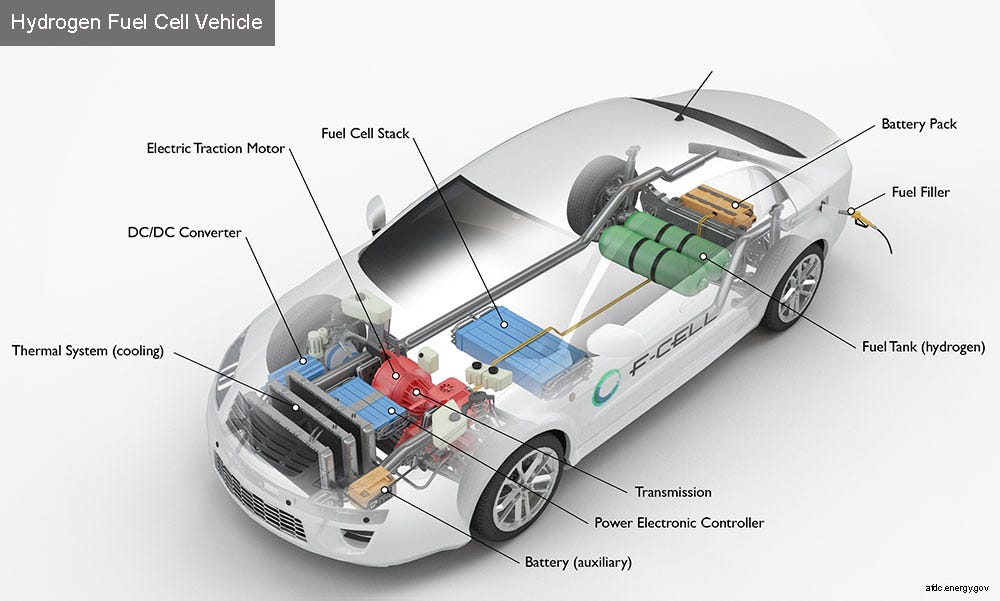
Refuelling Process and Hydrogen Supply Chain
Refuelling an FCEV is similar to refuelling a petrol car. It takes only a few minutes to fill the hydrogen tanks. However, the hydrogen supply chain is complex, involving production, transportation, and storage. Currently, most hydrogen is produced from natural gas , a process that emits carbon dioxide. There are also methods to produce hydrogen using renewable energy, known as green hydrogen, but these are still in the early stages of development .
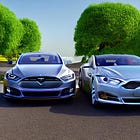
Beyond Range: Exploring Performance, Comfort, and Technology in Tesla Model S, Mercedes EQE 350+, BMW iX xDrive50, and Ford Mustang Mach-E
Infrastructure and logistics comparison.
The next section will delve into the differences in the maturity of charging station vs hydrogen fuelling station rollout, and examine the challenges related to hydrogen production, transport, and storage.
Charging Station vs Hydrogen Fuelling Station Rollout
The infrastructure for Electric Vehicles and Hydrogen Fuel Cell Vehicles is at different stages of development:
BEVs : The UK has a rapidly expanding network of charging stations, with over 25,000 public charging points , including fast-charging stations.
FCEVs : Hydrogen fuelling stations are less common, with around 15 publicly accessible stations in the UK as of 2021.
The disparity in infrastructure presents a challenge to the widespread adoption of FCEVs.
Hydrogen Production, Transport, and Storage Challenges
The hydrogen supply chain is complex and faces several challenges:
Production : Most hydrogen is produced from natural gas , a process that emits CO2. Green hydrogen production, using renewable energy, is still in its infancy.
Transport : Hydrogen is typically transported by road in high-pressure tanks or via pipelines, both of which are expensive and energy-intensive.
Storage : Storing hydrogen requires specialised tanks that can withstand high pressure, adding to the cost and complexity.
These challenges contribute to the current higher cost and lower availability of hydrogen fuel compared to electric charging.
Leave a comment
Efficiency and Cost Comparison
Well-to-wheel efficiency, range, and fuel costs.
Efficiency : BEVs are generally more efficient, converting about 59-62% of the electrical energy from the grid to power at the wheels. FCEVs convert about 25-30% of the energy in hydrogen to power at the wheels.
Range : Both BEVs and FCEVs offer ranges suitable for most daily driving needs, with some FCEVs offering slightly longer ranges.
Fuel Costs : Electricity for BEVs is generally cheaper than hydrogen for FCEVs, although this can vary based on location and energy prices.
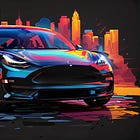
Examining the Impressive Durability of High-Mileage Teslas in the UK
Higher upfront costs for fcevs currently.
FCEVs tend to have higher upfront costs compared to BEVs, mainly due to the expensive fuel cell technology. However, government incentives and subsidies may help offset some of these costs.
Thank you for reading The EV Feed. This post is public so feel free to share it.
Sustainability Impacts
Carbon footprints and emissions.
BEVs : Emissions depend on the electricity source. If charged with renewable energy, BEVs can be nearly emission-free. YTD July 2023, the National Grid in the UK has generated 40% of electricity from fossil fuels, 35% from renewables and 20% from Nuclear and Biomass .
FCEVs : If hydrogen is produced from natural gas, CO2 emissions occur. Green hydrogen production methods can reduce emissions, but they are still under development.
Environmental Concerns Around Hydrogen Production from Natural Gas
Producing hydrogen from natural gas, known as steam methane reforming, emits CO2. Efforts are being made to capture and store these emissions, but the technology is still emerging.

The Road Ahead
Projections for growth and advancements for each technology.
BEVs : The UK government has announced a ban on the sale of new petrol and diesel cars by 2030, with a focus on promoting electric vehicles. This policy is expected to drive significant growth in the BEV market.
FCEVs : Hydrogen fuel cell technology is still in the early stages of commercialisation. However, it's receiving attention as a potential solution for heavy-duty transport like buses and lorries, where BEVs may not be as suitable.
Challenges and Uncertainties Facing FCEVs in Competing with BEVs
FCEVs face several challenges in competing with BEVs:
Infrastructure : The limited number of hydrogen refuelling stations is a significant barrier.
Cost : The current higher cost of FCEVs and hydrogen fuel may deter potential buyers.
Technology Maturity : FCEVs are less mature than BEVs, and further advancements are needed to make them more competitive.
Conclusions
Key takeaways on the pros and cons of each vehicle type.
Battery Electric Vehicles : Pros include higher efficiency, lower fuel costs, and a growing charging infrastructure. Cons include limited range compared to some FCEVs and dependence on the electricity grid's cleanliness.
Hydrogen Fuel Cell Vehicles : Pros include potential for longer range and quick refuelling. Cons include higher costs, limited infrastructure, and challenges related to green hydrogen production.
Role of Each Technology in Sustainable Transportation Future
Both BEVs and FCEVs have roles to play in a sustainable transportation future. BEVs are likely to continue dominating the passenger car market, while FCEVs may find niches in heavy-duty and long-range transport. Collaboration between governments, industry, and researchers will be essential to overcome the challenges and realise the potential of both technologies.
Final Thoughts
The comparison between Battery Electric Vehicles and Hydrogen Fuel Cell Vehicles is not a simple one-size-fits-all answer. Each has unique advantages and challenges, and the choice may depend on individual needs, preferences, and the specific use case.
As technology advances and the world moves towards cleaner energy solutions, both BEVs and FCEVs will likely find their place in the transportation landscape. Understanding the intricacies of these technologies is key to making informed decisions and contributing to a greener future.
The EV Feed is a reader-supported publication. To receive new posts and support our work, consider becoming a free or paid subscriber.
Powering the Future: Where Will the Electricity for Electric Vehicles Come From in the UK?

As the United Kingdom gears up for a greener future, electric vehicles (EVs) are rapidly becoming the new norm on British roads. Driven by government policy, environmental awareness, and advancements in EV technology, the shift towards electric mobility is accelerating. But a question that often arises is, "Where will the electricity for electric vehicl…
Dual Charging at Home: can I have more than one EV charger?
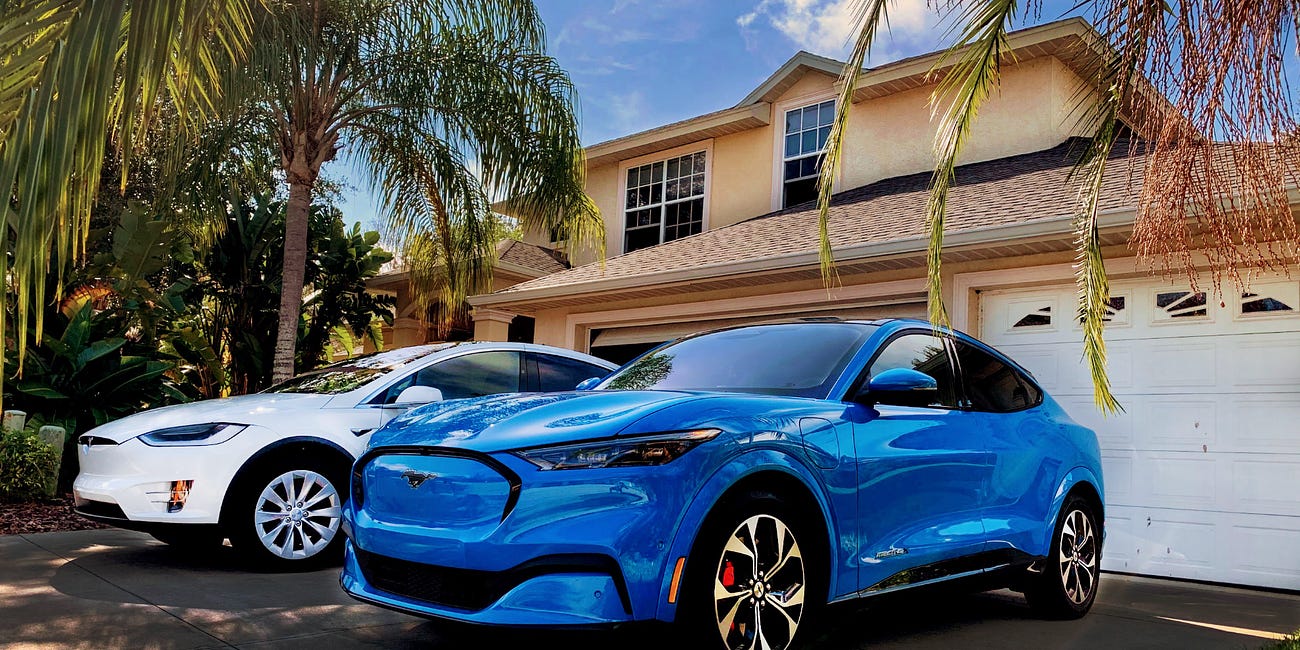
Electric vehicles (EVs) are revolutionising the way we drive, offering a cleaner and more sustainable mode of transportation. But what happens when you have more than one EV in your household? Can you have two electric vehicle chargers at home? The answer is yes, but it's not as simple as it might seem. This comprehensive guide w…
Ready for more?
Electric vs. Fuel Cell Vehicles: 'Green' Auto Tech Explained
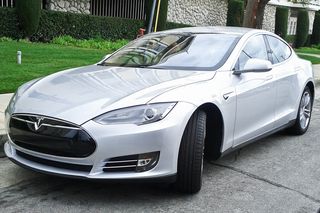
Battery-powered electric cars and hydrogen fuel cell vehicles have both seen advances in their development, and one or both of these technologies may represent the future of "green" automobiles.
Both technologies offer a cleaner alternative to internal combustion engines, and both use electric motors powered by electrochemical devices. But what's the difference between them? For one, electric vehicles use energy stored in a battery, whereas fuel cell vehicles have stored fuel that reacts to produce energy.
The two technologies face unique challenges in achieving widespread adoption, but both are promising, experts say. [ Hyperloop, Jetpacks & More: 9 Futuristic Transit Ideas ]
"They're not necessarily competing technologies — they're similar and complementary," said Lawrence Drzal, a chemical engineer and materials scientist at Michigan State University in East Lansing.
Electric vehicles
Whereas conventional vehicles burn fuel in an internal combustion engine , battery-powered electric vehicles don't have an engine. Instead, they use energy stored in batteries to power one or more electric motors.
Electric cars have undergone a surge in popularity in recent years, but electric vehicles were already being made in the late 1800s , according to Huei Peng, a mechanical engineer at the University of Michigan who works on the design and control of clean vehicles, including electric cars. The vehicles remained popular until the early 20th century, when they had to compete with mass-produced internal-combustion-engine vehicles.
Sign up for the Live Science daily newsletter now
Get the world’s most fascinating discoveries delivered straight to your inbox.
"After a couple of decades of competition, the internal combustion engine won, mainly because of the limitations of batteries," Peng told Live Science.
Interest in electric vehicles returned during the oil energy crisis of the 1970s and 1980s, but the cars never achieved mass production. Still, electric vehicles have been making a comeback since 2008, with the introduction of fully electric cars such as the Tesla Motors Roadster (and, subsequently, the Model S ), and the Nissan Leaf.
Many of today's electric vehicles run on rechargeable lithium-ion batteries — the same kind found in most laptops. These are replacing the cheaper lead-acid batteries used in most older models of electric vehicles. [ 5 Ways Your Tech Will Go Green in 2015 ]
Fuel cell vehicles
Fuel cell vehicles are also driven by an electric motor, but instead of being powered by a battery, they create the electricity in an onboard fuel cell, usually using oxygen from the air and stored hydrogen.
"Batteries and fuel cells are quite similar," said Shawn Litster, a mechanical engineer at Carnegie Mellon University in Pittsburgh who works on fuel cell design. The difference is, "with a fuel cell, you're able to decouple energy conversion from energy storage," he said.
Fuel cells use a catalyst to combine two reactants, which generates a flow of electrons (aka electricity). A variety of fuels can be used to support fuel cells, but the most common is hydrogen that is produced from natural gas. When oxygen and hydrogen react, they produce only water and heat, making them "zero-emissions" vehicles (like battery-powered electric vehicles).
"Probably the oldest [commercial] use of fuel cells is in the space program," said Drzal, who works on materials to make vehicles lighter and more fuel-efficient. While NASA could afford to pay virtually any price for them, for consumer vehicles, "you need fuel cells that are not only efficient, but cost-effective," Drzal told Live Science.
Today, two fuel cell vehicles are available on the market: the Hyundai Tucson (ix35 FCEV) and the Toyota Mirai. Currently, there are ten public hydrogen fueling stations in California, one in Connecticut and one in South Carolina, according to the U.S. Department of Energy. And several dozen more are under development in California, Litster said.
Electric vs. fuel cell?
Electric vehicles offer a promising alternative to internal-combustion vehicles because they don't directly burn fossil fuels. They are also capable of producing instant torque and smoother acceleration than conventional cars.
But electric vehicles aren't necessarily more environmentally friendly than conventional combustion vehicles. If the electricity used to charge the electric vehicle comes from a coal power plant, for example, it can be dirtier than even the worst internal-combustion vehicle, Peng said. The same reasoning applies to fuel cells — they're only as clean as the source of the hydrogen they use.
Electric vehicles are also limited by the range they can travel on a single battery charge. For short-distance commuting, this isn't a problem, but longer trips require lengthy periods of recharging . Battery swapping — in which a depleted battery is exchanged for a fully charged one — is one possible solution, and Tesla Motors has begun using this option.
Battery technology has improved dramatically, but "batteries are still too heavy and expensive, and don't have enough energy, which means a shorter range," Peng said. But he added that the price of batteries has come down significantly in the past 10 years.
Fuel cell vehicles don't have the same range limitations as battery-powered vehicles because they can simply store more (hydrogen) fuel. The main disadvantages of today's hydrogen fuel cell vehicles are the lack of sufficient infrastructure for hydrogen refueling, and the cost of the catalysts, Litster said.
Platinum is one of the most commonly used catalysts for fuel cells, but it's very expensive, Litster said. He and his colleagues are working on how to make platinum more efficient, while other researchers are developing catalysts made of lower-cost materials.
While battery-powered electric vehicles may have a head start on fuel cell vehicles, both technologies are advancing rapidly. It will be interesting to see where they are five years from now, Litster said.
Follow Tanya Lewis on Twitter . Follow us @livescience , Facebook & Google+ . Original article on Live Science .

World's fastest camera captures footage at 156 trillion frames per second
32 astonishing ancient burials, from 'vampire' decapitations to riches for the afterlife
What happened when the moon 'turned itself inside out' billions of years ago?
Most Popular
- 2 No, you didn't see a solar flare during the total eclipse — but you may have seen something just as special
- 3 'Gambling with your life': Experts weigh in on dangers of the Wim Hof method
- 4 Eclipse from space: See the moon's shadow race across North America at 1,500 mph in epic satellite footage
- 5 Superfast drone fitted with new 'rotating detonation rocket engine' approaches the speed of sound
- 2 Cancer patients can now be 'matched' to best treatment with DNA and lab-dish experiments
- 3 Space photo of the week: NASA spots enormous pink 'flames' during total solar eclipse. What are they?
- 4 Ancient Indigenous lineage of Blackfoot Confederacy goes back 18,000 years to last ice age, DNA reveals

Have a question?
Are electric vehicles definitely better for the climate than gas-powered cars, yes: although electric cars' batteries make them more carbon-intensive to manufacture than gas cars, they more than make up for it by driving much cleaner under nearly any conditions..
October 13, 2022
Although many fully electric vehicles (EVs) carry “zero emissions” badges, this claim is not quite true. Battery-electric cars may not emit greenhouse gases from their tailpipes, but some emissions are created in the process of building and charging the vehicles. Nevertheless, says Sergey Paltsev, Deputy Director of the MIT Joint Program on the Science and Policy of Global Change, electric vehicles are clearly a lower-emissions option than cars with internal combustion engines. Over the course of their driving lifetimes, EVs will create fewer carbon emissions than gasoline-burning cars under nearly any conditions.
“We shouldn't claim victory that with this switch to electric cars, problem solved, we are going to have zero emissions,” he says. “No, that's not the case. But electric cars are actually much, much better in terms of the impact on the climate in comparison to internal combustion vehicles. And in time, that comparative advantage of electric cars is going to grow.”
One source of EV emissions is the creation of their large lithium-ion batteries . The use of minerals including lithium, cobalt, and nickel, which are crucial for modern EV batteries, requires using fossil fuels to mine those materials and heat them to high temperatures. As a result, building the 80 kWh lithium-ion battery found in a Tesla Model 3 creates between 2.5 and 16 metric tons of CO 2 (exactly how much depends greatly on what energy source is used to do the heating). 1 This intensive battery manufacturing means that building a new EV can produce around 80% more emissions than building a comparable gas-powered car. 2
But just like with gasoline cars, most emissions from today’s EVs come after they roll off the production floor. 3 The major source of EV emissions is the energy used to charge their batteries. These emissions, says Paltsev, vary enormously based on where the car is driven and what kind of energy is used there. The best case scenario looks like what’s happening today in Norway, Europe’s largest EV market: the nation draws most of its energy from hydropower, giving all those EVs a minuscule carbon footprint. In countries that get most of their energy from burning dirty coal, the emissions numbers for EVs don’t look nearly as good—but they’re still on par with or better than burning gasoline.
To illustrate how EVs create fewer emissions than their counterparts, Paltsev points to MIT’s Insights Into Future Mobility study from 2019. 4 This study looked at comparable vehicles like the Toyota Camry and Honda Clarity across their gasoline, hybrid, plug-in hybrid, battery electric, and hydrogen fuel cell configurations. The researchers found that, on average, gasoline cars emit more than 350 grams of CO 2 per mile driven over their lifetimes. The hybrid and plug-in hybrid versions, meanwhile, scored at around 260 grams per mile of carbon dioxide, while the fully battery-electric vehicle created just 200 grams. Stats from the U.S. Department of Energy tell a similar story: Using the nationwide average of different energy sources, DOE found that EVs create 3,932 lbs. of CO 2 equivalent per year, compared to 5,772 lbs. for plug-in hybrids, 6,258 lbs. for typical hybrids, and 11,435 lbs. for gasoline vehicles. 5
MIT’s report shows how much these stats can swing based on a few key factors. For example, when the researchers used the average carbon intensity of America’s power grid , they found that a fully electric vehicle emits about 25 percent less carbon than a comparable hybrid car. But if they ran the numbers assuming the EV would charge up in hydropower-heavy Washington State, they found it would emit 61 percent less carbon than the hybrid. When they did the math for coal-heavy West Virginia, the EV actually created more carbon emissions than the hybrid, but still less than the gasoline car.
In fact, Paltsev says, it’s difficult to find a comparison in which EVs fare worse than internal combustion. If electric vehicles had a shorter lifespan than gas cars, that would hurt their numbers because they would have fewer low-emissions miles on the road to make up for the carbon-intensive manufacture of their batteries. Yet when the MIT study calculated a comparison in which EVs lasted only 90,000 miles on the road rather than 180,000 miles, they remained 15 percent better than a hybrid and far better than a gas car.
And while internal combustion engines are getting more efficient, EVs are poised to become greener by leaps and bounds as more countries add more clean energy to their mix. MIT’s report sees gasoline cars dropping from more than 350 grams of CO 2 per mile to around 225 grams by the year 2050. In that same span, however, battery EVs could drop to around 125 grams, and perhaps even down to 50 grams if the price of renewable energy were to drop significantly.
“Once we decarbonize the electric grid—once we get more and more clean sources to the grid—the comparison is getting better and better,” Paltsev says.
Thank you to several readers for sending in related questions, including Ross Burlington of Riverside, California, Lloyd Olson of Webberville, Texas, and Thomas Marshall of Lake Charles, Louisiana. You can submit your own question to Ask MIT Climate here .
Read more Ask MIT Climate
1 These figures are derived from comparison of three recent reports that conducted broad literature reviews of studies attempting to quantify battery manufacturing emissions across different countries, energy mixes, and time periods from the early 2010s to the present. We discard one outlier study from 2016 whose model suggested emissions from manufacturing the battery in our example could total as high as almost 40 metric tons. The lowest estimates typically come from studies of U.S. and European battery manufacturing, while the highest come from studies of Chinese and other East Asian battery manufacturing—which is consistent with the different energy mixes in these regions. For more information, see:
Erik Emilsson and Lisbeth Dahllöf. " Lithium-ion vehicle battery production: Status 2019 on energy use, CO 2 emissions, use of metals, products environmental footprint, and recycling ." IVL Swedish Environmental Research Institute, in cooperation with the Swedish Energy Agency, Report C444, November 2019.
Hans Eric Melin. " Analysis of the climate impact of lithium-ion batteries and how to measure it ." Circular Energy Storage Research and Consulting, July 2019. Commissioned by the European Federation for Transport and Environment.
Dale Hall and Nic Lutsey. " Effects of battery manufacturing on electric vehicle life-cycle greenhouse gas emissions ." The International Council on Clean Transportation, February 2018.
2 This estimate comes from Argonne National Laboratory's GREET (Greenhouse gases, Regulated Emissions, and Energy use in Technologies) Model, sponsored by the U.S. Department of Energy. It assumes comparable models of EV and gas-powered car, and that the EV has a battery with a range of 300 miles, similar to a Tesla Model 3. Different assumptions about battery manufacture would offer different comparisons; in this model, the battery of the EV entails close to 12 metric tons of CO 2 emissions.
3 Using the same GREET figures as above, manufacturing and end-of-life disposal account for around 9% of a gas car’s emissions, and around 29% of an EV’s (more than half of which comes from the battery alone). A plug-in hybrid EV is in the middle at around 17%. This analysis assumes the EV is charged with the average emissions intensity of the U.S. electric grid; that all cars drive around 173,000 miles in their lifetime; and that the gas car gets 30.7 miles to the gallon.
4 MIT Energy Initiative: Insights Into Future Mobility , November 2019.
5 U.S. Department of Energy Alternative Fuels Data Center: Emissions from Electric Vehicles . Accessed October 13, 2022.

More Resources for Learning
Want to learn more.
Listen to this episode of MIT's "Today I Learned: Climate" podcast on electric cars.
Keep Exploring
Check out these related Explainers, written by scientists and experts from MIT and beyond.

Energy Storage

Freight Transportation
Related pieces, how is lithium mined, how clean is green hydrogen, why have electric vehicles won out over hydrogen cars (so far), how well can electric vehicle batteries be recycled, mit climate news in your inbox.
- Skip to main content
- Keyboard shortcuts for audio player

- LISTEN & FOLLOW
- Apple Podcasts
- Google Podcasts
- Amazon Music
Your support helps make our show possible and unlocks access to our sponsor-free feed.
You asked, we answered: Your questions about electric vehicles

Camila Domonoske
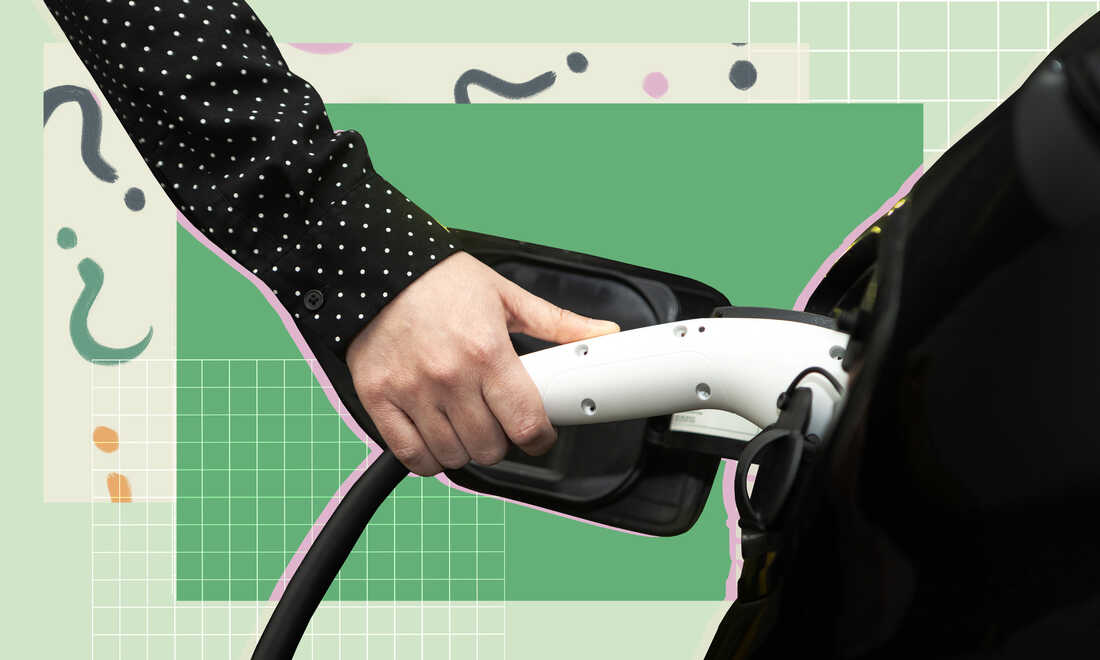
If you're thinking about getting an electric vehicle, you're not alone.
People in the U.S. buy more than a million new cars every month, and as of March, less than 10% of those are electric vehicles. But more than half of car shoppers are at least considering battery-powered cars and SUVs, according to multiple studies .
And shoppers have lots of questions. In January, The Sunday Story, an NPR podcast, asked listeners for their EV questions. More than 60 listeners sent in queries, and The Sunday Story and Life Kit teamed up to answer them. The listener questions have been edited for length and clarity.
Are EVs truly better for the planet, even with mining for batteries and fossil-fuel -based electricity to charge them? (This was the No. 1 question asked by our listeners.)
The answer is yes . Many researchers have confirmed it , and online tools let you compare the impacts for yourself. One of the most recent analyses comes from Corey Cantor with the energy research company BloombergNEF, who headlined his report last month: "No Doubt About It: EVs Really Are Cleaner Than Gas Cars."
"Big picture, moving away from spewing more CO2 into the atmosphere is a good thing for the climate," he says. And the environmental benefits of EVs are getting bigger over time as grids get cleaner.
The Electric Car Race! Vroom, Vroom!

- Amazon Alexa
Is it better from an environmental standpoint to buy an electric vehicle now, or keep driving the gas car you have until you need a new car? –Ali Mercural, Portland, Ore.
For the climate, there's a strong case for switching now.
Yes, creating that new EV — getting the materials to build it from scratch — is resource-intensive. But the climate impact of a gas-powered car increases every single day you drive it.
To be precise, more than 85% of a gas-powered vehicle's lifetime emissions come from using the car, not from building the car. That's according to researchers at Argonne National Laboratory. And that means the new EV, despite its manufacturing costs, will be cleaner over time.
Jessika Trancik , a professor at the Institute for Data, Systems and Society at Massachusetts Institute of Technology, suggests taking the long view on decisions like these. Think not just about emissions right now but over the entire time you'll own a vehicle.
"Generally speaking, switching to that electric vehicle is going to provide a benefit over the lifetime of the car," she says.
I'm not proud, but I've run out of gas twice in my life. Luckily, I had friends nearby to bring me a gallon of gas. What would happen if I ran out of charge in an EV? Would a tow truck come to charge me up? How long would that take? And how embarrassing would that be? –Robin Rzechula, Chicago
We can't promise it won't be embarrassing, but a tow truck could tow you to a charger. In some cities, AAA will bring a mobile charger to you.
Overall, charging is a different experience than fueling up. With a combustion engine, you have to regularly make a stop at a gas station to fill up. With an EV, for daily driving, most people charge at home overnight – which drivers frequently cite as a major perk of EV ownership. (This does require the ability to charge at home).
For road trips, on the other hand, many parts of the country still have limited availability of fast chargers, which are high-speed chargers designed for use in the middle of a trip. Charger speeds and reliability at public charging stations vary, and charging takes much longer than filling up at a gas station.
So charging takes less work day-to-day, but more planning on long trips. Map out chargers on your route so you won't find yourself calling AAA.
Does leasing an electric car come with the same perks (like tax rebates) as buying an electric car? –Hallie Andrews, Washington, D.C.
The same or better.
There's a federal $7,500 tax credit for purchasing an EV, now available as an up-front credit toward the cost of the car. But the list of vehicles that qualify is short because of requirements meant to support U.S. jobs and supply chains. Buyers also have to be under an income cap.
Leased electric vehicles all qualify for a $7,500 credit – no matter where they're built, with no income cap. Check your lease paperwork to confirm that the credit is being fully passed along to you.
Efforts underway to make cities more EV-friendly
Wouldn't it be better to design cities around mass transit and use mass transit than get everyone to convert to electric vehicles? – Thomas Guffey, Los Angeles
Yes, designing cities to encourage mass transit – and to make them more walkable and bikeable – has a lower carbon footprint than relying on electric vehicles, in addition to other benefits . Electric bikes also have a fraction of the environmental footprint of EVs.
Switching to EVs is an important part of fighting climate change, but far from the only change that needs to happen.
The digital story was edited by Malaka Gharib. The visual editor is Beck Harlan. We'd love to hear from you. Leave us a voicemail at 202-216-9823, or email us at [email protected].
Listen to Life Kit on Apple Podcasts and Spotify , and sign up for our newsletter .
- Life Kit: Sustainability
- electric vehicles
- electric vehicle
- mass transit
- Interview Questions
Electric Vehicle Vs. Fuel Vehicle: Which One is Right for You?
Be your own automotive guru! If you possess a passion for automotive technology and a solid grasp of cost analysis, all while maintaining your role as a responsible citizen, then this blog is tailor-made for you!
According to the 2023 survey, there are approximately 30 lakh registered fuel vehicles in India and only 1 lakh electric vehicles. In this blog, we have mentioned various other essential points to help you make the right decision.
Table of Contents
What are electric vehicles and fuel vehicles, top differences between electric vehicles and fuel vehicles, electric vehicle pros and cons , fuel vehicle pros and cons.
Learn more about Electric Vehicles through our YouTube video on
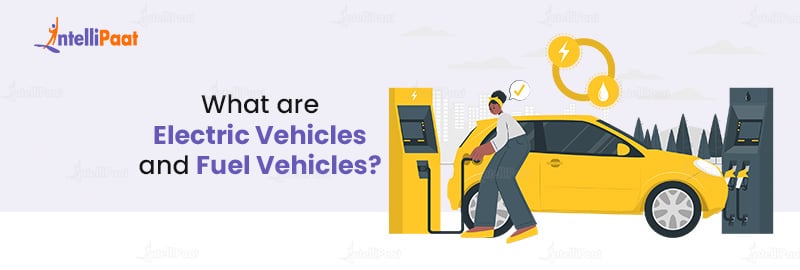
In the automotive industry, there are two types of vehicles: electric vehicles (EV) and fuel vehicles (FV). The source of power and ignition majorly differentiate them.
- Electric Vehicles (EVs) : These types of vehicles use electric motors and rechargeable batteries. The batteries store electricity from different sources, like the electric grid or solar panels. EVs are considered an alternative to conventionally fueled vehicles for sustainable transportation.
- Fuel Vehicles (FVs) : These types of vehicles use conventionally fueled motors for ignition. Fossil fuels, including petrol or diesel, are used for internal combustion. These vehicles require fuel to function. It converts stored energy into mechanical energy. The chemicals and gasses they emit cause air pollution, which gradually leads to climatic issues.
Electric vehicles are the future, and our EV Course is the best way to learn about them. Sign up today and start your journey!
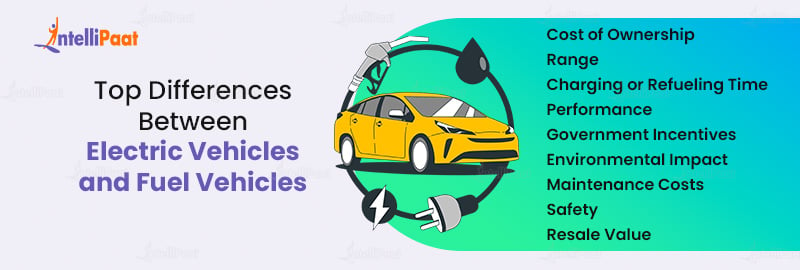
Discover the major differences between electric vehicles (EVs) and fuel vehicles (FVs). Uncover how energy sources, environmental impact, and operational dynamics set them apart.
Cost of Ownership of Electric Vehicles Vs. Fuel Vehicles
Exploring the economic landscape: A comparative analysis of owning Electric and Fuel vehicles
- Initial Cost: Generally, electric vehicles have a higher initial cost due to battery technology . But for fuel, vehicles have a lower initial purchase cost.
- Fuel Costs: EVs have lower fuel charges due to lower electricity costs. However, for FVs, it is higher due to gasoline and diesel expenses.
- Maintenance Costs: Electric vehicles have fewer moving parts, which leads to lower maintenance costs. On the other hand, it is higher for fuel-efficient vehicles due to engine and exhaust system maintenance.
- Repairs and Servicing: EVs have simpler mechanics, which generally lower the repair cost. Due to their complex working components , fuel vehicles may require more frequent servicing.
- Tax Incentives: Unlike fuel-powered vehicles, electric vehicles are often eligible for tax credits or subsidies.
- Resale Value: It is subject to their battery health and technology. And, for fuel-efficient vehicles, the resale value may be relatively higher.
- Long-Term Savings: In the case of EVs, the saving potential is greater in the long run. But for FVs, it may escalate over time.
Join the revolution in sustainable transportation with our innovative Electric Vehicle Projects and Electric Car Projects – take a step towards a greener future today!
Range of Electric Vehicles Vs. Fuel Vehicles
Discover the mileage spectrum of electric and fuel vehicles!
- Range Consideration: Typically, for EVs, the traveling range is lower as compared to FVs.
- Charging Locations : EV charging stations are scarcely available, whereas gas filling stations are widely accessible.
- Long-Distance Travel: EVs require prior planning because of the limited number of charging stations. So, fuel-efficient vehicles are well suited for long-distance trips.

Charging and Refueling Time of Electric Vehicles Vs. Fuel Vehicles
Time on Wheels: Unveiling the differences in charging and refueling for electric vs. fuel vehicles
- Charging or Refueling Time : Electric vehicles take longer to charge, whereas fuel vehicles have a much quicker process.
- Charging or Refueling Infrastructure : When compared to refueling infrastructure, the EV charging station network is not well established.
- Home Charging or Refueling: Home charging is much more convenient for electric vehicles, but it is not applicable for fuel-based vehicles.
- Charging or Refueling Speed Options : In EVs, there is an option for various charging speeds, and in FVs, there is a single refueling speed at gas stations.
Check out our blog to learn about the Types of Motors in Electric Vehicles.
Performance of Electric Vehicles Vs. Fuel Vehicles
Power Delivery Unveiled: A close look at the performance characteristics of electric and fuel vehicles
- Acceleration: Instant torque provides quick acceleration without gear shifts. For fuel-injected vehicles, acceleration varies based on engine type and power output.
- Top Speed: Competitive top speeds are attainable, depending on the EV model. whereas in FVs, variable top speeds depend on model and engine specifications.
- Handling : For EVs, there is a low center of gravity that improves handling due to battery placement. In FVs, handling may vary based on vehicle type and suspension setup.
- Noise: EVs have a quieter operation due to the absence of engine noise. But in fuel-injected vehicles, internal combustion engines generate engine noise during operation.
- Energy Efficiency : In electric vehicles, there is high energy efficiency due to electric propulsion. However, in fuel-efficient vehicles, energy efficiency varies based on fuel type and engine technology.
- Future Innovations : In EVs, rapid advancements in battery technology may impact performance and range. And in FVs, the evolution of combustion engines and hybrid technology may influence performance and efficiency.

Government Incentives for Electric Vehicles Vs. Fuel Vehicles
Navigating the landscape of transportation incentives: Government support for electric vehicles and fuel vehicles
- Purchase Incentives: When purchasing electric vehicles, the government provides subsidies and tax exemptions but limited purchase incentives.
- Faster Adoption and Manufacture of Electric Vehicles (FAME) Scheme: Subsidies and incentives under the FAME scheme are provided for EVs. Whereas for FVs, no direct government schemes are available.
- GST Benefits: There are reduced GST rates on EVs (5%). However, for FVs, standard GST rates are applied.
- Road Tax Exemptions: Certain states offer road tax exemptions for EVs. But, for FVs, there are no uniform road tax exemptions.
- Green Number Plates: EVs receive distinct green number plates. No specific distinction is made for fuel-powered vehicles.
- Research and Development: Financial support for EV-related R&D initiatives is provided. But, regarding FVs, there are no direct R&D incentives.
Unlock the Future of Convenience with Electric Vehicle Battery Swapping – Embrace the Revolution Today!
Environmental Impact of Electric Vehicles Vs. Gas Vehicles
Examine the environmental implications of electric vehicles versus conventional gas vehicles.
- Air Quality Improvement : EVs significantly improve urban air quality. On the other hand, FVs contribute to smog and air pollution.
- Carbon Footprint : Electric vehicles have lower carbon emissions because they are powered by renewable energy. On the other hand, carbon emissions are higher when fuel vehicles with non-renewable energy sources are used.
- Resource Depletion : With the adoption of electric vehicles, the automotive sector has significantly reduced its dependence on fossil fuels. On the other hand, traditional fuel-powered vehicles contribute to the depletion of resources and the exacerbation of global warming.
- Greenhouse Gas Emissions : EVs have lower or zero emissions, which helps meet climate goals. Whereas high greenhouse gas emissions are recorded when gas vehicles are used.
- Emissions : Due to zero tailpipe emissions, EVs do not contribute pollutants and greenhouse gasses to the air. But when it comes to gas vehicles, they emit pollutants and greenhouse gasses.
Unlock the future of transportation with stunning Electric Vehicle drawings and captivating EV Concept drawings – Explore now!
Maintenance Costs of Electric Vehicles Vs. Fuel Vehicles
Investigate the long-term financial implications of maintaining electric and fuel-efficient vehicles.
- Engine Maintenance : Minimal maintenance is required for electric vehicles. But fuel-efficient vehicles require more engine maintenance.
- Exhaust System : EVs don’t have exhaust systems, thus requiring no maintenance. Regular exhaust system checks and repairs are required for FVs.
- Brake System : Regenerative braking is used in electric vehicles; therefore, it causes less wear and tear. In gasoline vehicles, a conventional braking system is used, which requires regular maintenance.
- Cooling System : A simplified cooling system is present in an electric vehicle. But a more elaborate cooling system is required for fuel vehicle maintenance.
Discover the Differences Between IGBT and MOSFET , which powers Electric Vehicles!
Safety of Electric Vehicles Vs. Fuel Vehicles
Uncover the safety enhancements that make electric vehicles a compelling choice over fuel-powered vehicles.
- Fire and Explosions: Lower risk in EVs due to fewer flammable components. In FVs, there is a higher risk due to combustible fuels.
- Noise Levels: EVs are quieter due to their electric motors, which increases the potential risk for pedestrians. Fuel vehicles have engines with high audible noise, aiding pedestrian awareness on the roads.
- Maintenance Risks: EVs have fewer fluids and mechanical parts, reducing maintenance risks. More fluids and complex parts are potential risks associated with fuel-powered vehicles.
- Extrication Challenges: Specialized tools and procedures are required for EVs. On the other hand, standard tools and procedures are required for FVs.
- Battery Concerns: Concerns about thermal runaway and battery safety
Upgrade your electric vehicle with the cutting-edge Electric Vehicle Controller – the future of electric car control awaits!
Resale Value of Electric Vehicles Vs. Gas Vehicles
Gain insights into the market trends that shape the resale values of electric and gas vehicles.
- Market Perception: The market for EVs is growing exponentially, which may impact resale. But for fuel vehicles, market shifts may influence their values.
- Technological Changes: Rapid advancements in the domain of electric automobiles may affect the resale value. But for fuel vehicles, they have relatively stable technology.
- Maintenance Costs: For EVs, the maintenance costs are lower, which might enhance resale value. For FVs, higher maintenance costs may affect the resale value.
- Resale Value: For electric vehicles, the cost may be affected by battery health and technology. Whereas in fuel vehicles, resale value is influenced by model and age.
Fill your knowledge bucket with our blogs. Check out our blog on Types of Electric Vehicles .
Below mentioned are the key pros and cons offered by electric vehicles:
Want to start your career in the field of the electric automotive industry? Check out more through our blog on Career Opportunities in the Electric Vehicle Industry .
Get 100% Hike!
Master Most in Demand Skills Now !
Here is the list of the pros and cons of fuel vehicles:
Learn more about the Top Electric Vehicle Companies in India.
We have discussed the major differences between Electric and Fuel vehicles. A recent survey published in 2023 shows that AQI in many Indian cities is regularly in the “hazardous” or “very poor” range. Due to this categorization, a sustainable and ecologically balanced mode of transportation has become the need of the hour. Balancing environmental concerns, driving patterns, infrastructure availability, and budget considerations is vital to making an informed choice. Both options have their merits, with EVs contributing to sustainability and reducing operating costs. At the same time, fuel-efficient vehicles offer established convenience and longer driving ranges. Ultimately, the decision hinges on individual priorities and lifestyles. Exploring comprehensive comparisons and evaluating the latest advancements in both categories can provide additional insights. As the automotive landscape continues to evolve, your choices can contribute to shaping a greener and more efficient future of transportation.
Join Intellipaat’s Community to catch up with fellow learners and resolve your doubts.
Course Schedule

Course Preview
Expert-Led No.1
What's the Difference Between an Electric and Gas Car?
Here are all the things that separate evs from gas cars.

The benefits to getting an electric vehicle may seem obvious: no more filling up your car with expensive gas, fewer items on your vehicle to regularly maintain, and no tailpipe emissions. But you can't beat the convenience of knowing there will be a gas station just a few miles down the road when your tank is low, and gas-powered vehicles are familiar to most car buyers. We're going to cover all the differences between electric cars and gas cars in this article so you can decide which is right for you.
Electric cars vs. gas cars: Cost
How much you pay for your vehicle, whether it's gas or electric, can vary wildly. But electric vehicles typically cost more to purchase than their gasoline-powered counterparts. That said, a Consumer Reports study found that the total cost of ownership for an electric car is far lower than a gas car when factoring in things like purchase price, maintenance and fuel. So what gives?
Electric cars vs. gas cars: Fuel cost
Electricity typically costs a lot less than gasoline. The cost of charging an electric car is influenced by a lot of factors, including whether you charge at home or use a public charger, the price of electricity, and the efficiency of your electric car. But the fuel savings with an electric car can be immense. The Department of Energy released a study that says electric vehicle owners can save nearly $15,000 over a 15-year period, a huge savings for most owners.
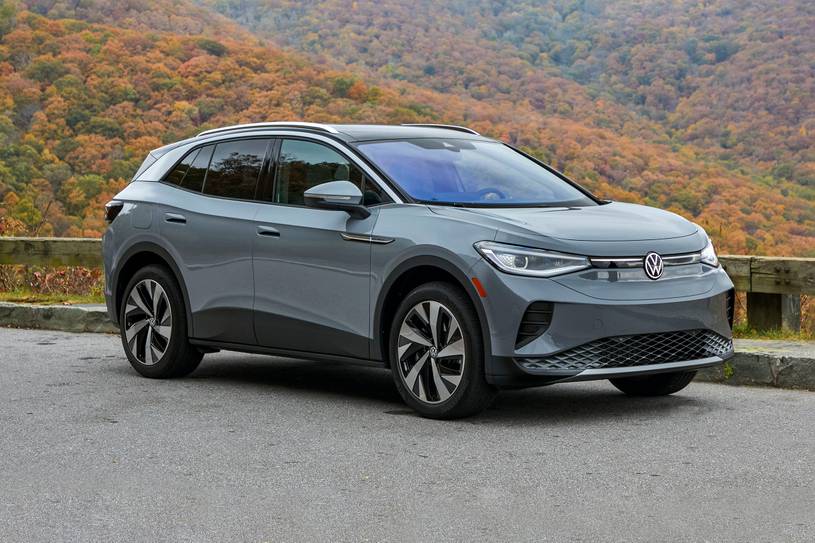
Electric cars vs. gas cars: Maintenance costs
Not only do electric cars have fewer wearable parts than gas cars (you'll never have to do an oil change on an EV), the wearable parts they do have often need less frequent maintenance. Because of regenerative braking, you'll likely get a longer life on brake pads and rotors. The way you drive and where you live impacts how much maintenance your EV needs, but we've got an article that can help you keep it in tip-top shape.
Government incentives for purchasing an electric car
You might be familiar with the $7,500 and $3,750 government incentives and rebates for purchasing an electric vehicle. You may be less familiar with all the rules and regulations that determine which shoppers and which vehicles are eligible for those incentives. Thankfully, Edmunds has a guide that can walk you through all the red tape and give you the confidence to make the right purchase.
Electric cars vs. gas cars: Emissions
Electric vehicles do not have tailpipe emissions, but that's not the only place where a vehicle's emissions are created. The construction of EVs — particularly their batteries — can be very carbon-intensive. And the generation of electricity in many states is done at plants that use dirty energy sources like coal. So, are electric vehicles really as environmentally friendly as they're made out to be?
Sort of. Significant greenhouse gas emissions are produced at the beginning and end of an electric vehicle's life, primarily related to battery technology. But those emissions are typically surpassed by the daily use emissions created by a gas-powered vehicle. The Environmental Protection Agency has a useful chart that shows just how significant day-to-day tailpipe emissions are to the overall greenhouse gas emissions produced by gas-powered vehicles.
A lack of tailpipe emissions doesn't just benefit the environment — it benefits our health. A report from the American Lung Association explains that transportation and electricity generation are the two biggest contributors to pollution. Taking gasoline cars and their tailpipe emissions off the road can dramatically impact pollution. Breathing in polluted air is linked to health problems ranging from asthma to heart attacks, so EVs driven with electricity generated from carbon-neutral sources can make a big difference to our health.
See Edmunds pricing data
Has Your Car's Value Changed?
Used car values are constantly changing. Edmunds lets you track your vehicle's value over time so you can decide when to sell or trade in.
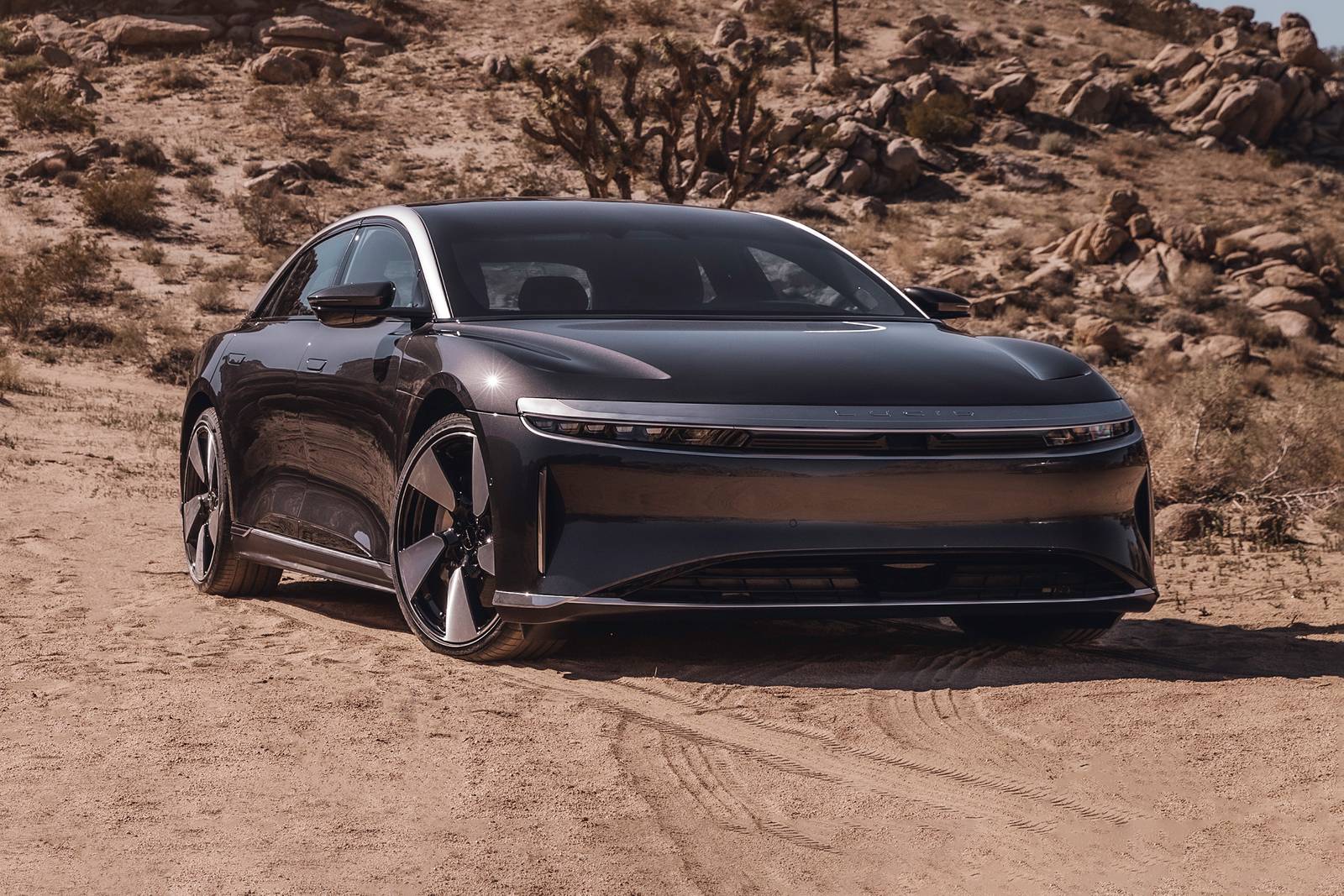
Driving electric cars vs. gas cars
Driving an electric car both sounds and feels different than driving a gas car. Electric cars don't have an engine or a conventional multi-gear transmission, making their acceleration smoother and quieter. (It's up to you to determine whether or not that's a good thing.) The instant torque delivered by electric vehicles can make them a lot of fun to drive, whether they're the ultra-sporty Tesla Model S Plaid or the more chilled-out Hyundai Ioniq 5.
You may have heard of one-pedal driving on electric vehicles. This is directly related to something called regenerative braking, which is exactly what it sounds like. When you slow down in an electric vehicle, the energy generated from braking is added back to the battery — this is another way EVs are much more efficient than gas-powered vehicles. You can use regenerative braking in some electric vehicles to bring them to a complete stop. So, by using only the accelerator pedal, you can both get your EV to easily pull away at a stoplight and also bring it to a smooth stop at the next one.
Electric cars vs. gas cars: Convenience
If you're able to recharge your electric vehicle at home every night, it can be every bit as convenient as driving a gas car. But if you can't charge at home or if you want to take your EV on a road trip, you may encounter some hurdles. There are not electric vehicle charging stations conveniently located every 15 miles on state highways like gas stations, and it takes much longer to charge an EV than it does to put gas in your car.
Thankfully, the EV charging infrastructure in North America is improving. More charging stations are being built and in more remote locations. That will make planning a road trip, or even a lengthy day trip, a much more pleasant experience. But that doesn't directly impact how long it takes to charge your car.
There's good news there, too. Some newer electric vehicles, like the Edmunds Top Rated Kia EV9 , use advanced 800-volt charging architecture, allowing them to quickly replenish their batteries. The EV9 can charge its battery from 10% to 80% in as little as 25 minutes using a high-powered DC fast-charging station. No, that's not as quick as filling up a Telluride with gas, but it's not an interminable rate when you consider the EV9 boasts more than 300 miles of electric range.
Electric cars vs. gas cars: Storage

Electric cars don't have two things that take up a lot of space on gas cars: transmissions and engines. The batteries and motors that come on EVs take up a fair amount of space, but they're increasingly spread out along the bottom of the vehicle rather than lumped together under the hood of your car. That gives EVs a potential advantage when it comes to storage.
The lack of a transmission tunnel going through the middle of your car can improve interior space and comfort. It's a lot easier to stretch out your legs in the back seat without a big bump getting in the way. Some EVs have clever storage bins in the front row in the space that would normally be taken up by the transmission. The Rivian R1T has a "gear tunnel" (pictured above) that goes through the middle of the truck, offering a convenient storage spot.
Some electric vehicles even have a "frunk" (front trunk) where a gas car's engine would go. Frunks can range from cavernous, like on the Ford F-150 Lightning, to almost comically small, like on the Genesis GV60. Keep in mind that some electric vehicles, like the BMW iX, do not have frunks. You'll just have to store your gear in the trunk.

Electric trucks vs. gas trucks: Towing
Electric pickup trucks are becoming more common, with the Ford F-150 Lightning and Rivian R1T as prime examples. And while both trucks boast impressive maximum towing capacities, their driving range takes a sizable hit while towing. In one Edmunds test , our long-term Ford F-150 Lightning saw its range drop by 26%. That's not a deal-breaker, but needing to stop to charge while towing can be a bit of a chore in a way that putting some more gas in the tank is not.
If you're only planning on modest towing, or towing for short distances, an electric truck may suit your needs. But you'll be giving up a lot of the convenience and flexibility that we now take for granted on an all-gasoline pickup.
Electric cars vs. gas cars: Variety
You may have noticed we've talked about a lot of electric SUVs and even a couple of trucks. There's a reason for that: Most new electric vehicles are SUVs. There are sedans available, notably the Tesla Model 3 and Edmunds Top Rated Electric Car, the BMW i5. But they're not exactly common. And remember when we talked about the high price of electric vehicles? Well, part of that boils down to them skewing toward SUVs. But it doesn't help that many electric vehicles are either made by luxury manufacturers or, at the very least, priced like luxury vehicles.
There's reason to believe that will change in the coming years as more electric vehicles are made by more manufacturers. But for now, you'll find a little less variety when shopping for an electric car vs. a gas-powered one.

Jake Sundstrom has worked in the automotive industry since 2017. He has written hundreds of car-related articles. Jake is currently an Editor for CarMax and has also contributed to National Hot Rod Association publications. When he's not driving cars, he's eating takeout inside of them (probably burgers, burritos or pizza).
2024 Acura ZDX
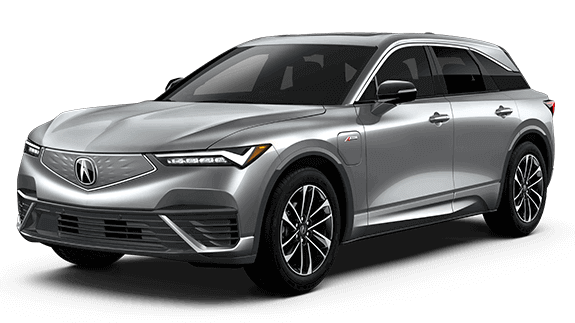
Other research topics
More in buying.
- The Best Time to Buy a Car
- AWD vs. 4WD: What's the Difference?
- 8 Steps to Buying a New Car
- 10 Steps to Buying a Used Car
- Negotiating Car Prices
What shoppers are searching for
Popular new cars.
- New Acura MDX
- New Chevrolet Bolt EUV
- New Chevrolet Bolt EV
- New Chevrolet Trailblazer
- New Ford Bronco
- New Ford Maverick
- New Ford Mustang Mach-E
- New Honda Accord
- New Honda Civic
- New Honda CR-V
- New Honda HR-V
- New Honda Odyssey
- New Honda Passport
- New Honda Pilot
- New Hyundai Palisade
- New Hyundai Santa Cruz
- New Hyundai Santa Fe
- New Hyundai Tucson
- New Kia Sportage
- New Kia Sportage Hybrid
- New Kia Telluride
- New Lexus NX 350h
- New Lexus RX 350
- New Lexus RX 350h
- New Mazda CX-30
- New Mazda CX-5
- New Mazda CX-50
- New Nissan Rogue
- New Subaru Crosstrek
- New Subaru Forester
- New Subaru Outback
- New Tesla Model 3
- New Tesla Model Y
- New Toyota 4Runner
- New Toyota bZ4X
- New Toyota C-HR
- New Toyota Camry
- New Toyota Camry Hybrid
- New Toyota Corolla
- New Toyota Corolla Cross
- New Toyota Highlander
- New Toyota Highlander Hybrid
- New Toyota Prius
- New Toyota RAV4
- New Toyota RAV4 Hybrid
- New Toyota RAV4 Prime
- New Toyota Sienna
- New Toyota Tacoma
- New Toyota Tundra
- New Toyota Venza
- New Volkswagen Atlas
- New Volkswagen Taos
- New Volkswagen Tiguan
Popular Used Sedans
- Used BMW 5 Series
- Used Chevrolet Impala
- Used Chevrolet Malibu
- Used Chrysler 200
- Used Dodge Charger
- Used Ford Fusion
- Used Ford Taurus
- Used Honda Accord
- Used Honda Civic
- Used Hyundai Elantra
- Used Hyundai Sonata
- Used Tesla Model S
- Used Toyota Camry
- Used Toyota Corolla
- Used Volkswagen Jetta
Popular Used SUVs
- Used Acura MDX
- Used Acura RDX
- Used Ford Edge
- Used Ford Explorer
- Used Honda CR-V
- Used Honda Pilot
- Used Hyundai Santa Fe
- Used Jeep Compass
- Used Lincoln Navigator
- Used Mazda CX-5
- Used Nissan Rogue
- Used Subaru Crosstrek
- Used Subaru Forester
- Used Tesla Model X
- Used Volvo XC90
Popular Used Pickup Trucks
- Used Ford F-150
- Used Nissan Titan
- Used Toyota Tacoma
Popular Used Hatchbacks
- Used Chevrolet Cruze
- Used Ford Focus
- Used Mazda 3
- Used Mazda 6
- Used Subaru Impreza
Popular Used Minivans
- Used Honda Odyssey
- Used Toyota Sienna
Popular Used Coupes
- Used BMW 3 Series
- Used Dodge Challenger
- Used Nissan Altima
Popular Used Wagons
- Used Kia Soul
Join Edmunds
Receive pricing updates, shopping tips & more!
Compare And Contrast Essay On Electric Vehicles Vs Fuel Cells

Show More This paper discusses electric vehicles and fuel cells vehicles. Most people use fuel cells vehicles. We tend to think that electric vehicles is better than fuel cells vehicles. In particular, we think that electric vehicles can move using electricity without fuel cells and are environment conscious. Both of them have merits and demerits. I discuss the differences between them. Electric vehicles are propelled by one or more electric motors powered by rechargeable battery packs. They have several advantages over vehicles with internal combustion engines. Electric vehicles convert about 59%-62% of the electrical energy to power at the wheels. Although the power plants producing the electricity may emit tailpipe pollutants, they do not emit them. Electricity from nuclear, solar, or wind powered plants causes no air pollutants. Therefore, they can be …show more content… They emit greenhouse gases, mostly carbon dioxide (CO2), that contribute to global climate change. The amount of the energy to use them has been decreasing, so it may be impossible to use them permanently. I think that electric vehicles are better than fuel cell vehicles from the viewpoint of energy efficient, environmentally friendly performance and their energy source. Fuel cell vehicles may be better when we think about recharge time, cost and driving range. Although we may cost more money to use electric vehicles, we should use electric vehicles more to preserve natural environment in the future. I think that both of them have several advantages or imperfections. On the other hand, I consider electric vehicles better machines for our blight future. A lot of researchers are working on improved battery technologies to increase driving range and decrease recharging time, weight, and cost. These factors will determine the future of electric vehicles, so I hope beneficial changes for them. Although it is free which machines we use, I want to drive them after comprehending their
Related Documents
What are the pros and cons of electric vehicles.
Not only does an electric vehicle help eliminate your carbon footprint but it has the coolness factor to driving it, they are fun to drive and are quieter than regular vehicles that run on gasoline. I would say that electric vehicles are a little too quiet and…
Nt1310 Unit 2 Case Analysis Essay
Explanation The cost of buying and operating EVs and HEVs can be attributed to two main contributors: the initial cost of purchase and the driving cost. The initial cost is the price of the vehicle which, in case of EVs, depends heavily on the price of batteries (Nykvist and Nilsson). The driving cost is the expenses required to keep the vehicle operational, such as maintenance, fuel, and spare part cost. Because these factors vary depending on the type of vehicle, a comparison that accounts for all of these criteria is needed to show the total life cycle cost (LCC) of each type of transport.…
The Pros And Cons Of Gasoline Cars
Electric cars only run on one battery, there is no internal combustion engine, muffler, gasoline tank, air or fuel filters, or any other parts needed to run a gasoline powered car. There are no tailpipe emissions, it creates fewer greenhouse gases, and they are cheaper to fuel per mile, 2 cents per mile compared to 12 cents per mile. Electric cars drive shorter distance, they only go 100 miles compared to 300 miles, and are not easy to operate. It takes hours to recharge an electric vehicle compared to minutes to refuel There are safety concerns associated with using a lithium-ion battery, as lithium is a highly reactive material prone to explosion (Schroeder, R. G., & Goldstein, S. M. 2017).…
Owning A Tesla Car
Owning a Tesla car has its benefits, yet there are few drawbacks that need to be addressed, to ensure this vehicle is widely applicable to the entire society. One of the benefits of owning an electrical vehicle, is no emissions are produces as the vehicle is powered and operated through electrical energy only. This means it requires no sort of fossil-fuels or biofuels, required to actively operate this vehicle. This is essential in current society, as the global warming due to excess production of greenhouse gases, is impacting the entire globe. Through the introduction of green vehicles that produce little to none greenhouse, these automobiles can effectively curb the threat of climate change due to greenhouse gases.…
Quebec Case Study
In other words, it doesn’t burn fuel nor does it release pollutants into the atmosphere; therefore the use of this transportation method could be beneficial for the future of our environment. (i.e. it runs on clean energy). The only type of emissions that could be considered would be from the charging of the battery from electric grids. However in Quebec this is 99% clean energy from Hydro-Quebec, hence reducing emissions significantly. Another advantage, would be considering the savings of owning an electric car.…
Critical Analysis Of Beiker
There is already cars that run on electricity that is better for the economy and the world we live on. Electric cars are better for the economy because it creates less pollution. Fossil fuels make more pollution and i have done research about it and you can check it out on the links I have provided below. Finally Bieker claims that the cars of the future will have digital frontiers. Digital frontiers are helpers or you can say personal assistants like apple's siri or google's google assistant.…
The Pros And Cons Of Electric And Hybrid Cars
Many electric and hybrid cars also include regenerative breaking, which is when the car recharges its battery when going down a hill and when the gas pedal is not engaged . This helps the car go a longer distance. Electric and hybrid cars should be more widely used because they help reduce carbon emissions. Carbon emissions lead to global warming which will and already has altered the environment in which we live. In order to try and reduce our impact on the earth, more citizens of the United States should switch over to electric and hybrid cars because they help reduce carbon dioxide emissions, there are incentives to buy them, they will reduce our dependence on foreign oil and they are quieter.…
Why Do Electric Cars Does Not Harm The Ecology Feel Good
It also has a long recharging time of 4 up to 6 Hours. In addition, the electric cars have a short driving range and speed, electric cars can go up to 100 mph and travel up to 80 miles (but it depends on the motor).That's not all, you also need to change the battery every 3 to 10 years. But what happens with the battery after 3 to 10 years? Electric cars are powered with a Lithium-ion battery which is unfriendly to the environment when it gets recycle, due to the toxic gases with are released. In addition, researchers have discovered that batteries using cobalt and cathodes with nickel and solvent-based electrode will affect the ecology and could produce deadly virus for humans being like cancer when it burns.…
Synthesis Essay On Electric Cars
Analytical Essay One With technology and environmental changes happening every day it is hard to keep up sometimes. Today’s economy promotes positive changes to the world to benefit the life of everyone on Earth in every aspect of life. Two articles have focused on one subject in specific to better educate the people and tell them through studies and analyzing what environmental benefits come from electric vehicles as opposed to gas-powered. First,”Electric cars may be worse for the environment than gas-powered” by Jason Russell explains the study of Professor Stephen Holland and his colleagues, discussing the misconception of a benefit from driving electric vehicles rather than gas-powered. Another article,”Positive and negative effects from electric car purchases” by Christian Andreas Klöckner gives a detailed, statistical report of how families use their electric vehicles, their effect on the environment, and how this can effect a household with multiple vehicles.…
Human Effects On The Amazon Rainforest
Also at the moment most electric cars are only two seaters which means that they are not a family car which will cause there not to be many people wanting to buy it. The battery’s in the car needs to be replaced every 3-10 years which is much shorter than non-electric…
Why Electric Cars Are Bad For The World
Electric cars have been around for a long time. Even back in the 1960’s the automobile industry was dabbling with electric cars. For the idea of an electric car having been around for at least 50 years now, the fact the world has not totally accepted the electric car as being better for the world show that it must not be better. In fact, electric cars are bad for the world for numerous reasons. These reasons include: electric cars are a waste of time where people are pursuing an idea that is not better, electric cars cause just as much pollution but in other ways, the batteries from electric cars are bad for the environment when the car is no longer in use, the electricity grid capacity in the world can not handle all cars being electric,…
Argumentative Essay On Electric Cars
And even if there is the use of some of the electric cars that do emit some gas because of the small tank that they have, it doesn’t even compare with the size of those Ram trucks. Another great thing about electric cars is that they can be powered by wind power or solar radiation, this means that you can use your car by absorbing the natural energy that comes from the sun or the wind. We are now capable to use…
Electric Cars Essay
Introduction Obviously, the electric cars has become more and more popular in the world. Many people driving their electric car on the street. Many manufactures began to produce electric cars, because the gasoline-powered automobiles pollute the environment and the oil resources have almost dry up. The government were badly in need of the new power and clean cars to remission the environment and resources problems. With the development of technology the electric cars seemingly is the best substitute so far.…
Fuel Cells And Its Effect On The Environment
Within the last decade, Fuel Cells have become more advanced and available to buy. The Fuel Cell was originally thought up in 1839, by a man named Sir William Grove, but a working model wasn 't made until 1959. After being used in one of NASA’s space programmes, the research and development on Fuel Cells died down and was put back in storage. In the 1900’s scientists decided to look at new ways to make these products available for commercialization. This has been successful as they are now used for portable generators, off-grid power for telecom stations, and drives for forklifts (FAQ).…
Argumentative Essay: Replacing Battery Powered Vehicles
Electric cars are better than gasoline cars. Imagine the world without the harmful pollution from burning fuels that produce dangerous fumes--a world where tremendously high gas prices no longer remain, and where we don’t completely deplete the world’s scarce supply of fossil fuels. We need to prevent smog and other dangerous gases like it. Save the environment; get a battery powered…
Related Topics
- Internal combustion engine
- Electric vehicle
- Plug-in hybrid
- Fossil fuel
- Electric car
Ready To Get Started?
- Create Flashcards
- Mobile apps
- Cookie Settings

Fuel Cell Electric Vehicles Vs Battery Electric Vehicles
L ast year, Union Transport Minister Nitin Gadkari drove Toyota Mirai, a hydrogen-powered car, to the Parliament sending a message that India needs to soon transition to green energy.
Toyota Mirai is one of the few Fuel Cell Electric Vehicles (FCEVs) in the world which only runs on hydrogen-generated electricity and was launched as part of the Toyota Kirloskar Motor pilot project. The company said that the car is capable of providing a range of up to 650 km on a single charge, with a refueling time of five minutes. The increasing global awareness about the negative environmental impact of ICE has been a driver for the launch of these FCEVs, just like the boost battery electric vehicles (BEVs, commonly called EVs) have gotten in the last few years.
However, unlike EVs, there have not been many vehicle launches in the hydrogen fuel cell segment. Hyundai's Nexo is probably the only other well-known car that runs on hydrogen-generated electricity in India.
Why has this technology not picked up the pace the way BEVs have? But, before we get there, let's understand the difference between both technologies.
Both BEVs and FCEVs run on electric energy stored in batteries. However, the difference lies in the source from where the batteries derive power. While BEVs' lithium-ion rechargeable batteries derive power from the grid, FCEVs' batteries derive power from fuel cells, meaning, the chemical energy of hydrogen gets converted to electrical energy with water as the exhaust.
Why FCEVs are lagging behind
FCEVs are still not very common in India, and there are several reasons why this technology is yet to take off.
One of the primary reasons is the lack of infrastructure to support FCEVs. "There are currently very few hydrogen refueling stations in India, which makes it difficult for people to use these vehicles on a regular basis. Without a robust network of refueling stations, it is difficult to convince consumers to adopt this new technology," said Sameer Aggarwal, founder & CEO, Revfin, an EV finance company.
However, infrastructure and adoption are two sides of the same coin. The more the adoption, the better will be the infrastructure, and the better the infrastructure the more the adoption. Also, as mentioned above, there are hardly any manufacturers going in for this, which has resulted in limited availability and thereby limited choice for the consumers. Due to this, it has become all the more difficult for makers involved in the segment to build momentum around the technology.
So, the key thing to note here is the slow adoption among consumers. And the reason behind this is the high cost of these vehicles. "Compared to traditional gasoline or diesel vehicles, hydrogen fuel cell vehicles are still relatively expensive to produce. This is due in part to the high cost of the fuel cell technology itself, as well as the cost of the materials used to build these vehicles," said Aggarwal.
Additionally, the storage and transportation of hydrogen is more complex than the storage of fossil fuels, which further increases the cost. "As India shifts to clean mobility, BEVs have an edge over HFCs, particularly in 4-wheeler segments, in terms of cost. The Indian automobile market is very cost-sensitive and HFC vehicles are relatively expensive when compared to conventional vehicles or for that matter electric vehicles, making them less accessible to the average consumer," said Pawan Mulukutla, Director, Integrated Transport, Electric Mobility & Hydrogen, World Resources Institute India.
In addition to this, there is also a lack of public awareness and education about FCEVs in India. Many people are still not familiar with this technology and may not understand the benefits of switching to a hydrogen-powered vehicle from their petrol or diesel vehicle/ICE engine vehicles. "Without a concerted effort to educate the public and promote the use of hydrogen fuel cell vehicles, it may be difficult to convince consumers to adopt this new technology," said Aggarwal.
The lack of incentives is another roadblock. While the Indian government has expressed interest in promoting hydrogen fuel cell technology, there has been limited funding and policy support to date, say experts. "For example, the FAME scheme does not offer incentives for Fuel Cell Electric Vehicles (FCEV), despite the scheme's goal of gradually shifting to alternative fuels to reduce dependence on conventional fossil fuels in the automobile industry. Additionally, there are no tax benefits with FCEVs unlike their electric vehicle counterparts making it difficult for HFC vehicles to gain a foothold in the market," said Mulukutla.
Do we need FCEV technology?
FCEVs have longer driving ranges and faster refueling times than most BEVs, making them better suited for long-distance travel and applications like commercial trucks and buses. For example, Mirai Toyota's HFC car has a 600 km range and can hold about 5.6 kg of hydrogen. BEVs, on the other hand, have lower operating costs and are better suited for shorter commutes and urban driving and are more suited for 2 and 3-wheelers. This is one of the reasons experts have been pushing for FCEVs as well. And, they can also be a great addition to achieving green mobility goals. The more the better, say clean energy enthusiasts.
In addition to that, the production of hydrogen can be sourced from renewable energy sources, such as wind and solar power as well. Further, there are some more advantages to hydrogen fuel cell technology besides longer ranger. This includes faster refueling and reduced dependence on rare earth metals.
"While a BEV takes about 6-8 hours to charge, an FCEV may be refilled in only 5 minutes. Also, BEVs rely on rare earth metals like lithium and cobalt, which are expensive and difficult to obtain sustainably. Too much reliance on these minerals can disrupt the supply chain making the need to diversify mineral usage and explore alternatives critical," said Mulukutla.
The ideal thing to do is to ensure FCEVs and BEVs coexist. "EVs have gained significant momentum in India, with the government setting ambitious targets for electrification of the vehicle fleet. Hydrogen fuel cell technology may turn out to be an attractive and viable option for high-capacity and long-distance cargo fleet/vehicles.
"Both FCEVs and BEVs vehicles have a role to play in the transition towards a more sustainable transportation system in India. The choice between the two technologies will depend on the specific needs and priorities of individual drivers and fleet operators," said Mulukutla.
The Indian government too has included both BEVs and FCVs in its target to achieve 30% electric mobility by 2030.

- Share full article
Advertisement
Supported by
Guest Essay
Sometimes, to Make an Electric Car Better, You’ve Got to Make It a Little Worse

By Ezra Dyer
Mr. Dyer is a columnist for Car and Driver magazine.
We’re at an inflection point in electric-car optimism. Over the past few years, as electric vehicle sales increased substantially and car companies announced an onslaught of new battery-powered models, it seemed that electric cars were a near-term inevitability. But for all the heady promise, E.V. enthusiasm seems to be cooling.
Ford recently announced that it’s cutting production targets for the Lightning, its electric truck. Brag-and-bluster Tesla projected that sales growth in 2024 would be “notably lower” than in recent years. Hertz is selling off about a third of its electric cars and Audi is slowing its transition to E.V.s. There are plenty of obvious headwinds for E.V.s — cost, range, and charging infrastructure (or lack thereof). But there’s also a more subtle issue at play, one that won’t be easily resolved: Electric cars are too boring.
I know this seems like a preposterous complaint, and I agree. On the list of things wrong with the world, “electric cars are dull” isn’t in the Top 5. I revel in being able to charge my plug-in hybrid Chrysler Pacifica with my solar panels, and believe that E.V.s are the answer to humanity’s long-term transportation needs. However, I also believe that the anesthetic experience of driving an electric car is a real hurdle to the technology’s widespread adoption, given that nearly every potential E.V. buyer grew up with the rich sensory experience of internal combustion.
Driving, as we all knew it before the arrival of mass-market electric cars a little more than a decade ago, involved familiar rituals that carved out a place in our collective psyche. You’d turn a key or push a button, feel a rumble of vibration through the seat and steering wheel, put a transmission in gear and listen to the revs rise and fall with upshifts and downshifts. Maybe you learned to drive with a manual transmission, with your feet dancing between clutch and accelerator as you chose your gears, herky-jerky at first but eventually tilling a furrow into muscle memory. There might be smells, oil and gas or diesel, not pleasant but not entirely unpleasant, either.
For people who love cars, and even those who don’t, this flood of visceral sensory feedback becomes associated with freedom and road trips, first dates and dashes to the grocery store.
Electric cars make a clean break from all of that. Climb into an electric car, and there’s often no key to turn or start button to push — it’s just on. There’s little noise except for the legally required pedestrian warning tone, which often sounds like Trent Reznor composing a creepy-synth Nine Inch Nails tune somewhere behind the front bumper. Some of them have a “one pedal” mode that doesn’t even require touching the brake pedal most of the time. It’s like driving a sensory deprivation chamber. For passengers, it’s luxurious. For drivers, it’s dull.
Sure, some versions of the Lucid Air and Tesla Model S can hit 150 m.p.h. in less than 10 seconds , but that’s important the same way it’s important for watches to be waterproof to a depth of 1,000 feet — as a brag for tedious rich people. The Tesla Cybertruck, with its polygon-meme shape and stainless-steel skin, is essentially the world’s most visible riposte to the boring-E.V. problem. Squeeze the accelerator, though, and it behaves like every other electric car, which is to say quick and coldhearted.
Powerful acceleration used to be a thrill in its own right, but E.V.s commodified and muffled that aspect of performance. A quick electric car is as common as a sunny day in Los Angeles, a pleasant base-line normal that’s mostly taken for granted.
Perhaps it’s true that many cars are generally boring regardless of how they’re powered, deliberately inoffensive in the name of mass appeal. And griping about sound and character might sound like the futile whining of a demographic raised on muscle cars and four-speed manuals — “OK Boomer” on wheels. But I’ve got some bad news for car companies hoping that the next generation will become E.V.-native.
My kids are 11 and 13 years old and they are manifestly unexcited about electric cars. When they play Forza on Xbox, I hear the shrieks of Lamborghinis and the roar of Ford Raptors emanating from the room. I test cars for a living, and the kids’ favorite car from the past few years was the Dodge Challenger Black Ghost, an 807-horsepower resource-pillager that represents the last gasp of supercharged V-8 thunder for Dodge. It’s a stupid car, really, peak mouth-breather, screaming of wretched excess. But its analog mechanical brutality activates some primal lobe deep in our brains, the one that catalyzes noise into adrenaline. The final V-8 Challenger rolled off the line on Dec. 22 last year, another dinosaur obliterated by the E.V. asteroid.
Car companies are trying to figure out how to recapture the distinctive personalities of cars like the Black Ghost in the E.V. era. Dodge envisions a booming speaker system for its future electric muscle cars, mimicking loud exhaust. BMW is going futuristic, with a soundtrack developed by Hans Zimmer — floor the accelerator, and the iX model fills with the noise of a synth-spaceship warp. Toyota is developing a manual transmission emulator for electric cars, to return some of the driving engagement. Or so we can hope.
Building a simulated manual transmission that’s not really connected to anything might sound a little bit pathetic, but I have reason to be optimistic, because I’ve seen how quickly technology can change. Twenty years ago, I went to Michelin’s alternative-fuel vehicle conference in Shanghai, and at that point nobody saw lithium batteries and electric cars on the horizon. Now we have electric pickup trucks that are as quick as a Corvette, and wind and solar power are the fastest growing and cheapest new means of producing electricity. The Biden administration aims to hasten E.V. adoption with new rules and tax incentives. And it seems logical that, after conquering their objective goals, car companies will turn to the subjective ones, the noises and nuances that make driving fun.
Look, all I want is an E.V. that sounds like a mountain lion keening at your bedroom window, the way a Porsche 911 GT3 does at full throttle. The GT3 — and many of our favorite cars — could easily be made much quieter. But Porsche understands that sometimes, to make a car better, you’ve got to make it a little worse.
The electric future is clean, smooth and refined. But we might get there sooner if we can figure out how to rough it up a little bit.
Ezra Dyer is a columnist for Car and Driver magazine.
The Times is committed to publishing a diversity of letters to the editor. We’d like to hear what you think about this or any of our articles. Here are some tips . And here’s our email: [email protected] .
Follow the New York Times Opinion section on Facebook , Instagram , TikTok , WhatsApp , X and Threads .
Electric Vehicles and Their Future Perspectives Essay
I think electric vehicles are the future of the automobile industry, even though they share only a small part of the total automobile market now. Despite being in a developing state today, they are more reliable, ecological, and flexible compared to the internal compulsion engines (ICEs), which use gasoline and similar products. However, many issues prevent them from conquering the automobile market: they require frequent recharge and consume a lot of electricity. While people often prefer gasoline cars over electric ones, I believe the future is on the side of EVs, as their advantages are vivid, and the disadvantages will be overcome with technical progress.
Recent studies show that the popularity and robustness of EVs have risen, and this tendency is continuing. Electric vehicles are safer, more flexible, and easier to drive, in addition to their higher ecological value (Un-Noor et al. 1225–27). Public charging facilities are an important part of the EV industry, as they need to be recharged regularly. The power of charging stations and batteries’ capacity is constantly increasing, and the refueling frequency was close to the ordinary internal compulsion engine in 2018 (Gnann et al. 326).
It means that the worktime of EV batteries and gasoline cars’ engines became similar, and ICEs lost their advantage. While before, the capacity of the electric battery was expected to be quite low, the situation is changing as more advanced batteries are developing (Un-Noor et al. 1239–40). Thus, electric vehicle issues are continuously solving, and future electric cars may be even more productive than gasoline ones.
The main current problem, however, is the large price of EVs and their service compared to ICE. It is much easier to simply pour the fuel into the car than create an electric battery that can be recharged. Electric vehicles were popular at the beginning of the automobile industry despite being slow and expensive, similar to all cars in those times (Un-Noor et al. 1218). The quickly developing internal compulsion engines replaced them due to the low fuel prices and larger velocities. Despite today’s EVs conquering the market again, they are quite heavy for the power infrastructure and require smart recharge stations, which do not load the system much (Un-Noor et al. 1268–69). Social acceptance of buying EVs depends highly on the recharge stations’ availability, and while some countries provide privileges for electric car purchasing, people still accept gasoline cars better (Gnann et al. 315; Un-Noor et al. 1276). Still, as one can see, this situation will change as EVs become more and more developed.
As I would need a car for traveling in urbanized and semi-urbanized areas, I would buy an EV. There are enough charging stations in cities, and if I need to travel for a long distance, which will probably be rare, I can use additional batteries. The advantages of electric cars, along with their ecological clearness, are their robustness, safety, and high flexibility. In my opinion, as EV technologies will continue to improve, electric cars will become much better than today. Therefore, buying such a car is also an investment in the future.
One can see that EVs are a robust and useful tool. Despite having issues, such as high prices, overreliance on charging stations, and large loads on power infrastructure, those problems are solving actively. Batteries’ power and capacity are constantly rising as technical progress continues, and smart charging stations enable them to recharge quickly and without a high-power load. I would certainly buy an EV, as I believe it is the best choice for city travel, and their technologies will be developing actively. Despite being unreliable for traveling long distances, the situation is constantly improving, and the future of EVs is certainly bright.
Works Cited
Gnann, Till, et al. “ Fast Charging Infrastructure for Electric Vehicles: Today’s Situation and Future Needs. ” Transportation Research Part D: Transport and Environment , vol. 62, 2018, pp. 314–29. Web.
Un-Noor, Fuad, et al. “ A Comprehensive Study of Key Electric Vehicle (EV) Components, Technologies, Challenges, Impacts, and Future Direction of Development. ” Energies , vol. 10, no. 8. 2017, p. 1217. Web.
- Chicago (A-D)
- Chicago (N-B)
IvyPanda. (2023, December 14). Electric Vehicles and Their Future Perspectives. https://ivypanda.com/essays/electric-vehicles-and-their-future-perspectives/
"Electric Vehicles and Their Future Perspectives." IvyPanda , 14 Dec. 2023, ivypanda.com/essays/electric-vehicles-and-their-future-perspectives/.
IvyPanda . (2023) 'Electric Vehicles and Their Future Perspectives'. 14 December.
IvyPanda . 2023. "Electric Vehicles and Their Future Perspectives." December 14, 2023. https://ivypanda.com/essays/electric-vehicles-and-their-future-perspectives/.
1. IvyPanda . "Electric Vehicles and Their Future Perspectives." December 14, 2023. https://ivypanda.com/essays/electric-vehicles-and-their-future-perspectives/.
Bibliography
IvyPanda . "Electric Vehicles and Their Future Perspectives." December 14, 2023. https://ivypanda.com/essays/electric-vehicles-and-their-future-perspectives/.
- Treatment of Wastewater
- Contrast Between Electric and Gasoline Cars
- Electric Vehicle Charging System Infrastructure Support
- Pricing Strategy for a General Motors' Chevrolet Bolt EV
- Indigenous Elders' Impact on Urbanized Children
- Selecting Specification of Electric Vehicle
- Electric vs. Internal Combustion Engine Vehicles: Comparison
- Comparison of Electric and Gas-Powered Vehicles
- The EV Products in China
- Analysis of the Better Place Electric Car Scheme
- Self-Driven Cars from the Future Perspectives
- Driving in the Winter and in the Summer
- Electric and Gasoline Cars Comparison
- Intelligent Transportation Systems' Challenges and Needs
- Public Transportation in Australia: Impact of COVID-19

IMAGES
VIDEO
COMMENTS
With the full tank, a gas vehicle can go about 300 miles before being refilled. On the other hand, fully charged electric vehicles can only travel 100-200 miles without an additional recharge. Therefore, fuel-powered cars are more reliable in terms of going for long-distance travel.
When it comes to the advantages of electric cars, there are several key points to consider. Electric cars are more energy-efficient compared to gas cars. Sixty percent of the energy contained in the batteries of electric cars goes directly to powering the wheels, while gas cars only convert 20 percent of the energy from fuel to run the wheels.
On the other hand, maintenance cost is that make long-term using a car more or less attractive. It is possible to state that a full battery's cost of an electronic vehicle (EV) is $6.86, while an average gasoline car's tank may require $40 to fill (Hearst Autos Research, n.d. para. 19. Despite the mentioned fact, EVs can drive only 50-100 ...
Gas cars also refuel more quickly than even the fastest-charging EVs, reducing downtime and overall trip length on longer journeys. Fixing a gas car tends to be less expensive as well, despite the ...
Regardless of these differences, electric cars are often cheaper to run than gasoline cars because of their better energy efficiency. The EPA estimates that the electric Kia EV6, for instance ...
Battery Electric Vehicles: Pros include higher efficiency, lower fuel costs, and a growing charging infrastructure. Cons include limited range compared to some FCEVs and dependence on the electricity grid's cleanliness. Hydrogen Fuel Cell Vehicles: Pros include potential for longer range and quick refuelling.
The key difference between EVs and ICEVs is a source of fuel where an electric car utilizes electricity, but a gasoline vehicle uses fossil fuel derivatives. EV uses a high-voltage battery, which provides electric energy to be turned into mechanical energy, but ICEV uses internal combustion from fossil fuel derivatives, which are burned to ...
Benefits of Electric Cars. The most noteworthy attribute of electric cars is their eco-friendliness. They boast of having zero emissions of carbon dioxide, thus minimal environmental pollution. This is contrary to cars with internal combustion engines, which emit close to 20% of carbon dioxide into the atmosphere (Scoulos 162).
For one, electric vehicles use energy stored in a battery, whereas fuel cell vehicles have stored fuel that reacts to produce energy. The two technologies face unique challenges in achieving ...
Yes: although electric cars' batteries make them more carbon-intensive to manufacture than gas cars, they more than make up for it by driving much cleaner under nearly any conditions. October 13, 2022. Although many fully electric vehicles (EVs) carry "zero emissions" badges, this claim is not quite true.
A. Pros of Electric Cars. Electric cars offer several environmental benefits. They contribute to the reduction of greenhouse gas emissions and help to decrease air pollution, ultimately leading to a cleaner and healthier environment. According to the Union of Concerned Scientists, "electric vehicles produce zero tailpipe emissions, and in some ...
Electric Cars versus Gasoline Cars is an argumentative essay that explores the pros and cons of electric cars versus gasoline cars. The essay looks at the cost, environmental impact, and performance of both types of cars. ... if 49% of the energy used in an electric vehicle comes from the coal, it would lead to the emission of low levels of ...
The most fuel efficient trim for each car is included and additional trim levels are shown for cars over $35,000 if they have a lower fuel economy rating than other trims shown (they are less ...
Background Information on Electric Vehicles (EVs) EVs are vehicles powered by one or more electric motors, with energy stored in batteries or fuel cells. There are various types of EVs, including plug-in hybrid electric vehicles (PHEVs), battery electric vehicles (BEVs), and fuel cell electric vehicles (FCEVs).
If you're thinking about getting an electric vehicle, you're not alone. People in the U.S. buy more than a million new cars every month, and as of March, less than 10% of those are electric ...
This essay had set out to offer a comparative analysis of electric vehicles and traditional gas-powered cars. A list of similarities and differences was offered before the discussion delved into the strengths and weaknesses of each of the two types of vehicles. It has been shown that the two types of cars have similar body and cabin designs.
In contrast to conventional battery electric vehicles, hydrog en fuel cell electric vehicles. generate their energy using a fuel cell powered by hydrogen, as opposed to relying. completely on ...
But for fuel, vehicles have a lower initial purchase cost. Fuel Costs: EVs have lower fuel charges due to lower electricity costs. However, for FVs, it is higher due to gasoline and diesel expenses. Maintenance Costs: Electric vehicles have fewer moving parts, which leads to lower maintenance costs.
Electric cars vs. gas cars: Fuel cost. ... There are not electric vehicle charging stations conveniently located every 15 miles on state highways like gas stations, and it takes much longer to ...
Electric cars have lower maintenance costs, as they have fewer moving parts and do not require oil changes. Additionally, the cost of electricity is typically lower than gasoline, resulting in lower fuel costs over time. In fact, studies have shown that electric cars can be cheaper to own and operate than traditional vehicles in the long run.
We tend to think that electric vehicles is better than fuel cells vehicles. In particular, we think that electric vehicles can move using electricity without fuel cells and are environment conscious. Both of them have merits and demerits. I discuss the differences between them. Electric vehicles are propelled by one or more electric motors ...
Electric vs. Gasoline-Powered Cars Term Paper. As electric cars become less costly and able to cover greater distances per single charge, consumers more and more tend to view them as a potentially preferable alternative to the traditional gasoline-powered automobiles. Electric vehicles seem to perform better on several crucial indicators, such ...
Let's say 25% of all cars will be EVs by 2030, and these cars are not running on gasoline. A 25% decline in gasoline cars from today implies a 17% decline in consumption of oil in the U.S. by 2030.
Toyota Mirai is one of the few Fuel Cell Electric Vehicles (FCEVs) in the world which only runs on hydrogen-generated electricity and was launched as part of the Toyota Kirloskar Motor pilot project.
Hertz is selling off about a third of its electric cars and Audi is slowing its transition to E.V.s. There are plenty of obvious headwinds for E.V.s — cost, range, and charging infrastructure ...
It is much easier to simply pour the fuel into the car than create an electric battery that can be recharged. Electric vehicles were popular at the beginning of the automobile industry despite being slow and expensive, similar to all cars in those times (Un-Noor et al. 1218).